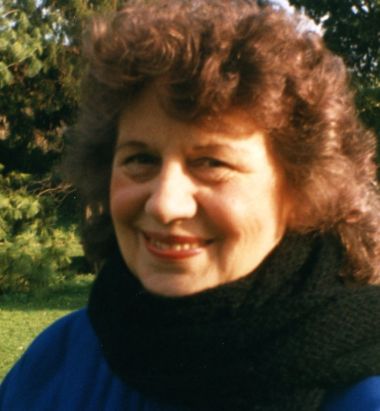
Kate Thomas, 1988
This article analyses a well documented instance of suppression and evasion as exercised and demonstrated by the Findhorn Foundation. That revealing instance gained profile in confronting solicitor correspondence included below, representing Kate Thomas, also known as Jean Shepherd.
 Kate Thomas, 1988 |
CONTENTS KEY
2. Harassment and Attempted Interdict
3. Holotropic Breathwork Contradicted
4. The Facade of Conflict Resolution and Peace
5. Dictatorship and Glaring Contrivance
6. Farce of the Spiritual Community
8. Superficial Myth of Unconditional Love
10. Being Neighbours with New Age Gestapo
11. Necessity of Police Escort
12. Internet Defamation and Community Living
13. Hazards of Nonjudgmentalism
15. A Legal Complaint Commences
16. Inaccurate Response from Bettina Jespersen
17. Further Delays and Correspondence
18. More Evasion and Due Measures
19. Legal Statement of Problems
20. Denial of Membership in Foundation Ruse with Solicitor
21. The Commercial Workshop System
22. Suppressed Letter to The Northern Scot
Rarely has any “alternative” organisation made so many mistakes with a dissident as did the Findhorn Foundation with Kate Thomas (my mother Jean Shepherd; Thomas was her second marital name). This case has been considered unique by close analysts. See also The Findhorn Foundation: Myth and Reality (2007).
The predominant feature of this unusual case is one of suppression. The extent of that affliction has amazed investigators. How could any organisation, claiming such advanced characteristics, have been guilty of such error? However, the documentation abundantly testifies to the discrepancy. Kate Thomas was never allowed to express her views at the Findhorn Foundation. Elaborate cordoning procedures stifled her contribution. Legal analysis discovered ample proof of her suppression, marginalisation, and exclusion.
Of British nationality, Kate Thomas (1928-2017) first became an affiliate (or associate member) of this organisation in 1989, moving from Cambridge to the village of Findhorn, where she lived until subsequently transferring residence to the nearby town of Forres. She had been drawn by the repute of the Findhorn Foundation for “spiritual” prowess. The myths were quickly shattered. What she discovered was a hierarchy of alternative therapists, plus other presumed “spiritual experts,” who would not tolerate any query or criticism of their decisions and policies.
The crunch came when she complained at the latitude extended to Stanislav Grof. This controversial celebrity of the Esalen Institute (California) gained influence at the Findhorn Foundation in 1989, a prominence which increased under the patronage of Foundation Director Craig Gibsone. The Director soon made known his ambition to become a practitioner of Holotropic Breathwork, the trademark exercise in hyperventilation promoted by Grof Transpersonal Training Inc.
Gibsone achieved his desire. The commercial therapy was conducted in “workshops” supplied by the Esalen model. A problem being that Kate Thomas, and other observers, found very distressing symptoms and after-effects accompanying this therapy in too many cases. Some after-effects were extreme, leaving the victims estranged from their daily routine, in states resembling shock and acute confusion. Gibsone and other influential Foundation personnel dismissed this visible factor, applying very unconvincing interpretations. Grof was the immaculate therapist, representing income. All drawbacks were explained in terms of therapeutic and spiritualising effects of the wonder technique of hyperventilation (abnormally induced speed and depth of breathing).
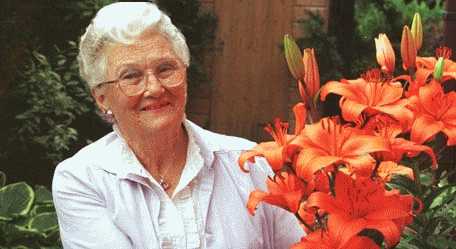 Eileen Caddy |
Kate Thomas found that Eileen Caddy (1917-2006) was a useless resort in such an emergency. Caddy was a co-founder of the Foundation, along with her husband Peter, who had made his dramatic exit a decade earlier. Eileen Caddy did recognise that something was wrong, that the Grof therapy was inappropriate. However, she had developed a habit of not interfering with management and staff decisions.
Eileeen Caddy complained to Thomas that the hierarchy took no notice of her, so she had stopped making any objection. The supine attitude of Caddy was in complete contradiction to her widely presumed role as the guiding spiritual influence within this community. Thomas perceived that Caddy was a toy in the hands of the management, a mere insignia who could be invoked as a convenient auspice of divine associations.
The oracular books of Eileen Caddy commenced with God Spoke to Me (1971), conveying themes that are controversial elsewhere. The Findhorn Foundation emerged from the Findhorn Bay caravan park, where Caddy resided during the 1960s. Thomas and others discovered that the "divine messages" were employed as a convenience, by the Foundation staff, for the varied economic strategies of this organisation.
2. Harassment and Attempted Interdict
Another difficulty for Kate Thomas was harassment from two prominent Foundation staff members, namely Eric Franciscus and Loren Stewart. The former (a German) attacked her clandestinely, not bothering to question her about the nature of events. His American accomplice Loren Stewart was by far the more visible aggressor. Those two officials conspired to successfully block renewal of her associate membership, adopting evasive tactics about the reasons for their behaviour.
These events resulted in a critical chapter about the Foundation in the autobiographical work of Thomas entitled The Destiny Challenge (1992). The situation was distinctive enough, in that she was a local resident of Forres, living very close to Cluny Hill College, the new identity for the hotel which the Foundation had acquired and were now using as a centre of alternative therapy and “spirituality.” Eric Franciscus was in charge of this establishment, being the official head of Education.
What education meant in this sector was nothing like the conventional idea of learning. Instead, the message was therapy, “attunement,” holistic innovation, “channelling,” and other manifestations of the new age entrepreneurial instinct. High prices were charged for the courses and “workshops,” clearly influenced by the Esalen role model. The affluent clientele were international, with many Americans and Germans. Scots were a bare minority.
Despite their monotonous theme of “conflict resolution,” the Foundation hierarchy placed the Thomas book with their solicitor in an unsuccessful attempt to create a legal interdict. This thwarted tactic occurred solely because of the criticism of certain policies and Foundation personnel, expressed in chapter 14 of The Destiny Challenge.
Grof’s Holotropic Breathwork was a major target for Thomas, who had seen at firsthand what that “therapy” could do to clients subjected to abnormal breathing (hyperventilation), an exercise which induced screaming, trauma, sickness, vomiting, and hallucination. While some clients reported euphoric feelings, others were distressed to varying degrees, even to the point of nervous breakdown.
 Alex Walker |
Foundation personnel like Eric Franciscus and Alex Walker ignored the crucial issues involved, instead opposing Thomas for daring to criticise elite roles and policies. Walker was a Trustee and “management consultant” who exercised some control of the economic purse. He was rumoured to have been involved in the effort to place an interdict upon the book by Thomas, published in June 1992. Certainly, in July 1992, Alex Walker denied in the local press that Kate Thomas had ever been a member of the Findhorn Foundation. "She is not and never has been a member of the Findhorn Foundation" (quoted in Stephen Castro, Hypocrisy and Dissent within the Findhorn Foundation, 1996, p. 15).
This denial, amounting to outright misinformation, was quickly disputed by Thomas in the same local newspaper. Other local residents knew that she had been an associate member for one year prior to being blocked. Walker retreated into the background, evidently aware that he had made a mistake. The distorting attitude of the Foundation personnel sparked an adverse press coverage.
A significant episode occurred when a medical doctor in Forres contacted two Findhorn Foundation Trustees in 1992. Dr. Sylvia Darke was very concerned about the case of a female victim of Eric Franciscus, a woman who was mentioned with emphasis in The Destiny Challenge (chapter 14). The two Trustees were Alex Walker and Mary Inglis. Dr. Darke tried to get these celebrities to take due account of what was on record about the victim (initials GW). The results were so negative that the doctor (a retired GP) wrote a letter of complaint (02/09/1992) to the local newspaper, from which I quote here:
Alex Walker, when approached, declared the material presented by Kate Thomas in chapter 14 of The Destiny Challenge was wholly distorted - this, despite the fact that he had personally read no more than 'a few' pages. I proffered him the gift of a book [the Thomas book], which he declined, as he had no wish to read the chapter referred to, and had already formulated an opinion as to its content.
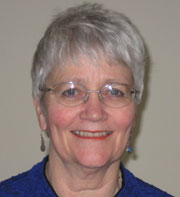 Mary Inglis |
Mary Inglis, another Trustee, knew nothing about the matter relating to GW, nor of the promised investigation. She agreed, however, to accept a free copy of the book, which I delivered within the hour. Upon later enquiry, it was discovered that she had not read more than 'a few' pages, nor did she propose to. She declined to discuss how she viewed the matter [of the victim GW]. (Castro, Hypocrisy and Dissent within the Findhorn Foundation, p. 123)
Dr. Darke knew that something was very wrong in this situation, especially as she had personally rescued the victim GW from a predicament of acute stress at the Findhorn Foundation in 1991. The evasion of the Foundation Trustees and staff became notorious in Forres.
In subsequent years, Mary Inglis was described, in Foundation promotions, as conducting "courses and trainings worldwide in personal and group development, creativity and the Transformation Game" (Findhorn Foundation Workshops and Events May-December 2009, p. 37 col. one). The commercial board game known as the Transformation Game (in use at the Foundation since 1978) is considered by critics to comprise a major distraction from due education.
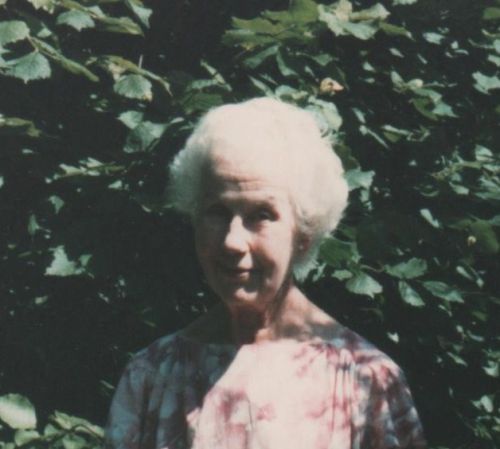 Dr. Sylvia Darke |
Towards the end of chapter 14 in The Destiny Challenge, Thomas describes the fate of GW in some detail. Some analysts have concluded that this episode alone was justification for the critical chapter 14 (dated November 1991). The critical chapter includes the reproduction of a letter from Dr. Darke ("Janice") to Loren Stewart dated September 14, 1991. The major part of that letter is quoted here:
I must also strongly protest, as a medical practitioner, at the extreme stress suffered by Gemma W. through the prolonged and non-confrontational tactics used to evade her legitimate questioning of the defamatory remarks [against Kate Thomas] aforementioned, and specially those made to her personally by Eric Franciscus, whom you have all supported despite his clearly untruthful accounts of what actually transpired. Such tactics are known to all sociologists and are fully documented in research material on group and cult behaviour.
I took Gemma to my own home on Friday evening as she was obviously suffering acute shock and emotional stress as a result of her further approach to both Eric Franciscus and Eileen Caddy on learning of the content of your irrational and dismissive letter to Kate Thomas. What you have collectively subjected this young woman to (and I include Eileen Caddy) is an infringement of the basic human rights which one would justifiably expect to operate in your organisation, made infinitely worse, in my opinion, by the fact that you purport to promote spiritual values, inner development, unbiased attitudes and unconditional love. I therefore question your rights to publicise yourselves in this unsubstantiated manner. (Thomas, The Destiny Challenge, p. 976)
Copies of the abovequoted letter from the medic were despatched to six prominent members of the Foundation, including Trustee Alex Walker. "Not one of the six responded" (ibid., p. 977). The lethargy and evasion of the Foundation officials was locally in disrepute.
3. Holotropic Breathwork Contradicted
Kate Thomas was obliged to counter the hostility of the Foundation staff, who did everything possible to suppress her legitimate protests and to deny her any hearing within their community. “Conflict resolution” did not apply to close neighbours, being a total myth created by the entrepreneurial process dominated by Alex Walker and others. Local and national newspaper coverage resulted. Local medics soon took an interest in the issue of Holotropic Breathwork.
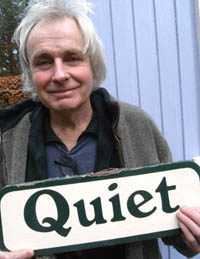 Craig Gibsone |
The Scottish Charities Office (SCO) became alarmed at reports of adverse symptoms contracted by clients of the alternative therapy known as Holotropic Breathwork (HB). This exercise in hyperventilation was the creation of Stanislav Grof at the Esalen Institute in California, being mediated to the Findhorn Foundation in 1989 via the collaboration of Craig Gibsone, an Australian who opted to become a practitioner. Gibsone believed in the spiritual relevance of this "therapy." He was keen to conduct "workshops" in HB, presuming a knowledge based upon the inspiration of Grof and his voluble team of American "facilitators."
The intensive and extremist nature of HB workshops alarmed some colleagues of Gibsone. However, he was victorious in his ambition to continue those workshops. Holotropic Breathwork could induce hallucinations and acute traumas in clients. Many female participants were subject to screaming during the HB sessions, caused by the pain of abnormal breathing combined with "bodywork." Some clients experienced euphoria. Others were subject to stress and problematic after-effects. A support group had to be innovated for some distressed clients, a feature of behind-the-scenes crisis that was not advertised.
The SCO commissioned a report on HB from the Pathology Department of Edinburgh University. This was submitted in 1993 by Regius Professor Anthony Busuttil. The report was negative, warning about the dangers involved in such a clinically untested therapy. The SCO then duly recommended a suspension of HB within the Foundation. The management eventually and reluctantly complied, in evident fear of consequences, including adverse publicity. Nevertheless, a core of diehard HB practitioners continued to operate within that organisation, heedless and defiant of all official warnings. The degree of impropriety may be gleaned from the fact that William Bloom, the leading therapist connected with the Foundation, attempted to make HB a fixture at a distant Piccadilly (London) venue in 1995. See my Letter to BBC Radio (2006).
Some Foundation officials adopted the attitude that Thomas was to blame for the SCO interference. In actual fact, the SCO were alerted by both a local medical doctor and a victim of HB. The victim, a female, had been hospitalised by the hyperventilation technique for which Grof Transpersonal Training Inc. charged over £400 (for a week of participation). The commercial nature of the Grof enterprise requires emphasis. This was very obvious to critics. Yet Gibsone and other enthusiasts managed to give the impression that all costs were perfectly legitimate in the pursuit of "self-discovery."
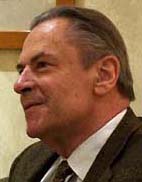 Stanislav Grof |
The Grof supporters within the Foundation (including William Bloom) were totally uncritical, believing that Dr. Grof was more or less infallible. They were misled by the fact that some books of Grof had been published by State University of New York Press, an anomaly which some say should have received a charge of damages. The hazards created by American counterculture were severe. See also Contesting Stanislav Grof Therapy.
The idolised Dr. Grof failed to reply to the letter of complaint sent to him by Kate Thomas (The Destiny Challenge, pp. 938-9). In an earlier phase, Grof had dosed terminal cancer patients in America with excruciating quantities of LSD, an extremist action for which there was no legal comeback when the recipients died soon after (Shepherd, Pointed Observations, 2005, pp. 12-13).
4. The Facade of Conflict Resolution and Peace
Kate Thomas had been proven correct about Holotropic Breathwork. However, the Foundation spokesmen would never acknowledge this factor. Instead, Eric Franciscus (Education Manager) contrived his slanders (without meeting her) and banned her from visiting Cluny Hill College. That venue, a former hotel, had been purchased very cheaply (due to condition problems) by the Foundation in the 1970s. This Victorian building, having more than eighty bedrooms, was the headquarters of the "spirituality" or "education" project at the Foundation, amounting to alternative therapy and related new age lore.
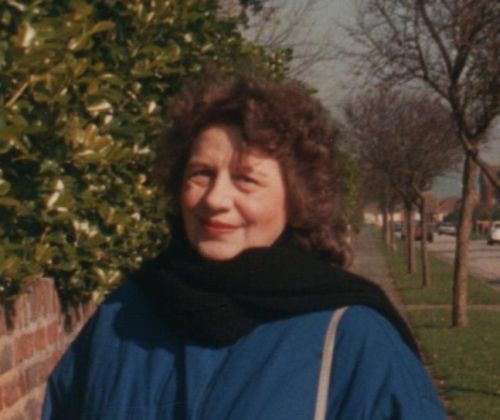 Kate Thomas, 1988 |
An extant tape recording reveals the extent of the unreasoning attitude expressed by Franciscus in March 1994. His argument is perverse by rational standards. He would only consent to see the victim of stigma (Kate Thomas) at a public cafe in Forres, not within Foundation precincts. He had allocated to himself the role of a divine intermediary, favoured by God to preside over Cluny Hill College. “Whoever told you that life is just?” This caustic remark of Franciscus to Thomas is preserved on tape. That overbearing quip illustrates the non-existent standard of justice in operation amongst the elite staff of an organisation very much in query (Shepherd, Pointed Observations, 2005, p. 215).
Another tape-recorded example of evasion came in response to the insistence of Thomas that she wanted to know the reason for dismissing her case. The desire for clarification related to her expulsion from Open Community membership (section 5 below). Franciscus replied: "What if it was an intuitive decision [of the management], and there is no reason?"
This flippant excuse was supported by the assertion that he (Eric Franciscus) "sometimes received 'guidance' that he did not understand" (Pointed Observations, p. 215). It was impossible to argue on equal terms with the intangible 'guidance' that even the Foundation management could not comprehend.
The solicitor of Kate Thomas advised that she had a strong case against the Foundation. However, she did not pursue any course of legal action other than to request the reason for her expulsion in January 1994 (section 5 below). In a charitable spirit, she was instead open to reconciliation at every turn. This prospect was continually denied and dismissed by the nominal advocates of conflict resolution and unconditional love. Another glib sentiment, employed ad nauseam by the relentless opposition, was “peace.”
Stan Stanfield was an influential American staff member of the Foundation. In 1991 he was emissary for an international Peace Camp sited in Iraq during the Gulf War. However, Stanfield reported the discord pervading this camp, a discord in which he himself figured. His account of the Iraq episode, that same year, evoked a letter of complaint to the Foundation magazine One Earth. The objecting letter from Alan Rees commented:
A lot of this 'New Age' stuff seems to be ill thought out, self-indulgent and downright dangerous....It would be interesting to hear what the Kuwaitis think about it [Stanfield's report]. It will doubtless be of great comfort to them to know that while they were being robbed, tortured, raped, murdered and treated with a savagery reminiscent of the worst excesses of the SS, Mr. Stanfield was doing his best to ensure that no one would come to their rescue, while agonising about whether to let cats into his tent.
 Cluny Hill College, Forres (subsequently known as Findhorn Foundation College) |
In May 1993, the same American emissary for peace discriminated against Kate Thomas by refusing her entry to a workshop entitled The Art of Living in Peace. That workshop was held at Cluny Hill College, a building close to her home (she was a neighbour on Cluny Hill). Stanfield was the “focaliser” for this event, exhibiting the nominal auspices of UNESCO (via Pierre Weil, the patron of Craig Gibsone, and rector of the Holistic University of Brazil). This was not actually an official UNESCO event; the UN associations were exploited by Foundation staff. Thomas had actually paid for inclusion. She attended the morning session before the almighty focalising presence intervened as an agent of “peace” (Castro, Hypocrisy and Dissent within the Findhorn Foundation, 1996, pp. 110-112).
The peace advocate Stan Stanfield physically blocked Thomas from entering Cluny Hill College. His vocal performance on that occasion resembled more an army of occupation than a peace mission. Stanfield was a major agent of suppression at this period. He declared, in a Scottish newspaper, that he had been one of the staff members who sent the book by Thomas to a solicitor, in the hope of an interdict because of a critical chapter on the Foundation.
Kate Thomas (my mother) stated to me that she came to dread the sound of American voices, so often assertive and dismissive, the persons concerned being convinced that they knew how to do everything best. Their role enforced exclusion, and the application of stigma, without any hearing. They also accomplished the feat of maintaining an entrepreneurial spirit at all costs to public wellbeing and education.
Loren Stewart (an American) arbitrarily banned Thomas from the main buildings at The Park (Findhorn), where, for instance, many "workshops" were conducted. This prohibition was maintained by a form of tacit staff concensus. Thomas informed that the underlying reason for this cordon was a fear that she might divulge details about incongruous events, which were numerous in the organisation under discussion. There was the accompanying strategy of suppression; she was not allowed to give any talk herself, despite her experience of over thirty years in the field of mysticism. Instead she was allocated the degrading role of a toilet cleaner.
In contrast to the profiteering new age circuit, Kate Thomas had offered to give free talks (on mysticism). This prospect was contemptuously dismissed by the Foundation staff, who relied upon moneyspinners like Caroline Myss from America. The lucrative "workshop" racket, promoted by the Findhorn Foundation, had the ambivalent auspices of charity status permitted by a bureaucracy (including the Scottish Charities Office, more recently OSCR) who have been accused of a myopia amounting to public hazard and confusion.
5. Dictatorship and Glaring Contrivance
Another very assertive person was the new Director, Judy Buhler-McAllister, a Canadian, later known as Judy McAllister. In 1991 she took over directorship from Craig Gibsone (an Australian). She proved far more unrelenting than the latter (who was occasionally amiable). Buhler-McAllister refused to discuss matters with the local British dissident/victim Kate Thomas. Instead, she furthered the stigma applied by the dogmatic German staff member Eric Franciscus.
This commitment to a total non-resolution of problems is memorable. The anomaly entailed (on the part of the Director) a categorical refusal to receive a visit from a local (British) medic who was deeply concerned at the situation. That medic was familiar with the fate of Thomas and another female victim of Franciscus, who had been threatened with getting “burnt” (Castro, Hypocrisy and Dissent, 1996, p. 59; Shepherd, Pointed Observations, 2005, p. 215).
The dictatorship of Judy Buhler-McAllister extended to the notorious episode in which Kate Thomas was excluded from Open Community membership in January 1994. No adequate explanation was given for this action. Three months later, while ruthlessly denying Thomas a due hearing, Buhler-McAllister belatedly supplied three "justifications" that were deemed extremist by people outside the Foundation. Firstly, Thomas was associated with the intervention of the Scottish Charities Office (SCO) in relation to Holotropic Breathwork. Secondly, Thomas had published a book with a critical chapter about the Foundation. Thirdly, the "opinions, assessments and personal experiences of various staff members."
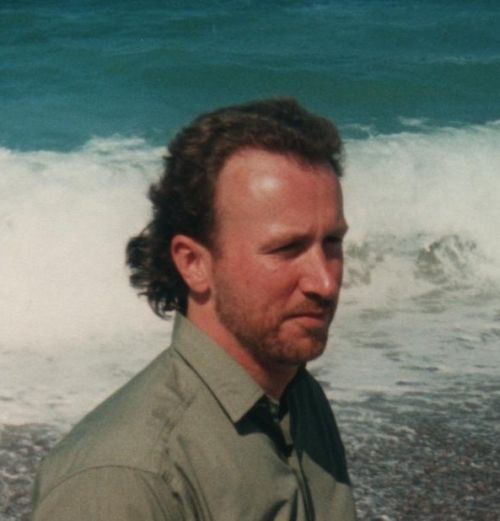 Stephen Castro at Findhorn |
These justifications were effectively exposed in the local press as inadequate and misleading. The writer was here Stephen Castro, a dissident ex-member closely familiar with the details. In letters to the Forres Gazette, he reported how Judy McAllister had refused to answer his queries about Thomas; the Foundation Director even stated that any letters "will remain unanswered."
Stephen Castro also pointed out the gravity of the fact that the Foundation were still ignoring the recommendation of the SCO concerning Holotropic Breathwork, a situation reflecting badly upon the Directorship of Judy McAllister (Castro, Hypocrisy and Dissent within the Findhorn Foundation, 1996, pp. 120, 130-131). The rather obvious bias of the Director, in favour of Holotropic Breathwork, is viewed elsewhere as a factor against the Foundation, not against Kate Thomas.
Castro duly pointed out that Thomas had been accepted for Open Community membership one year after the publication of her book The Destiny Challenge (which appeared in June 1992). This acceptance occurred because of the reconciliation policy of Thomas, which was well known locally. Her book was evidently not the factor which had caused expulsion.
The opinions and assessments of unnamed staff members, invoked by the Director, decode to the suspect opposition of Loren Stewart, Eric Franciscus, and others. The critical chapter 14, in the book by Thomas, detailed the hostilities of Stewart and Franciscus; the relevant account in The Destiny Challenge was understated, and more than justified under the circumstances.
Thomas struggled to gain a hearing and to obtain an appropriate reason for her segregation. It proved impossible to evoke either of these civilised procedures in the face of new age apartheid. Kate Thomas eventually had to resort to a solicitor, who on her behalf requested Judy McAllister to give "details of the reasons for expulsion." That was in July 1994 (Castro, Hypocrisy and Dissent, p. 132).
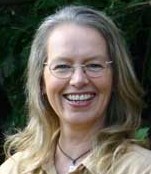 Judy McAllister |
The recourse of Judy McAllister was to seek support from the Foundation solicitors. A contrivance was now strongly suspected on the part of the Foundation management. Their solicitor now divulged that there was no such thing as membership of the Foundation. Only management and Trustees had any constitutional rights within this community. The Edinburgh solicitor had evidently been requested to provide a convenient loophole.
There was a local uproar in Forres, as many people knew that there were extensive references to membership in Foundation literature. A great deal had been made of full membership over the years. Open Community membership was now declared to be a mere “contractual relationship.” The very unconvincing argument was that, in the absence of any effective membership, Kate Thomas could not have been expelled. Scottish locals did not take this ploy seriously. There were many local grievances against the Foundation.
The version of expulsion by Kate Thomas differs markedly from the Foundation version. She is on record for stating her belief that she was ejected because of an embarassing question she had very recently (immediately prior to expulsion) put to the staff about whether the dire case of GW (a Scottish female victim of Eric Franciscus in 1991) had been duly investigated. Under duress from local Scottish opinion, the case of victimisation had been given a formal enquiry in August 1992, only to be conveniently dismissed by the Foundation management and staff. Thomas had asked how this enquiry could have been effectively conducted without the presence of GW (Castro, op. cit., pp. 122-3, 228-9). Loren Stewart and Franciscus were closely implicated in the successful plot to eliminate dissident concerns. However, Judy McAllister had ultimate responsibility in this matter.
The conclusion is pressing that an appropriate reminder of the embarassing case of GW, which had been continually evaded by the Foundation staff, was the trigger for a renewed offensive against Thomas. In that way, the management and staff evidently believed they could eliminate the embarassment, so strongly associated with Thomas, who had been supported by the victimised GW. The latter had left the Foundation in 1991, acting under medical advice and of her own inclination (section 2 above). GW would have been willing to attend had there been any due committed enquiry, a prospect clearly considered undesirable by the pretenders to conflict resolution and unconditional love.
A related event surfaced in the local press in May 1994. At that time, GW tried herself to gain a hearing, "but has failed in her bid to arrange a face-to-face interview with senior Foundation officials about the events surrounding the abrupt termination of her membership three years ago" (E. Taylor, "Former member refused hearing by Foundation," Forres Gazette, May 25, 1994).
GW was effectively negated by Judy McAllister, then induced to give a brief audience to the former victim of Eric Franciscus. Dr. Sylvia Darke accompanied GW into Foundation precincts for the purpose of that meeting, but was herself not allowed to attend, having to wait outside in her car. Judy McAllister had never met the senior British medic, and was clearly averse to doing so (a discrepancy she repeated in the instance of Kate Thomas).
GW found that her objective was blocked by the Foundation Director (Judy McAllister), who refused her request that Dr. Darke should be allowed into the meeting to verify facts concerning her withdrawal three years ago. GW asked about the formal enquiry into her departure which had occurred at the Foundation in August 1992, at the instigation of local Scottish Councillor Robbie Laing. GW asked if minutes of that enquiry were available. The Foundation Director said that there were no official minutes (Castro, op. cit., p. 128). This meeting ended very unsatisfactorily for GW, who, like Kate Thomas, was now consigned to oblivion by the malfunctioning charity-registered organisation.
6. Farce of the Spiritual Community
In 1994, the sympathetic local press mediated Kate Thomas via the report:
Thomas said that any other member, of whatever category, could receive what she called the same ‘callous treatment’ that she had received – despite giving up home and livelihood to live in the area – if there was no membership constitution to protect them, and no voluntary upholding of human rights. She added that she thought Foundation Director Judy Buhler-McAllister had gone to extreme lengths to deny her a face-to-face hearing. (Quoted in Stephen Castro, Hypocrisy and Dissent within the Findhorn Foundation, 1996, pp. 133-4)
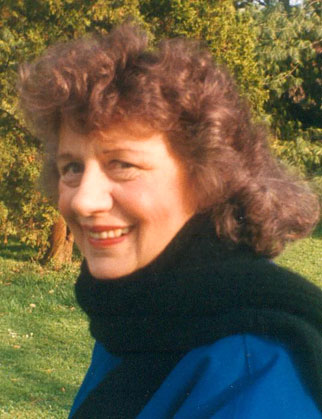 Kate Thomas, 1988 |
The farce of “spiritual community” continued. Thomas endured the hostility often directed at her by staff members. She remained in Forres, despite the opposition. She found that visitors to the Foundation did not share the hostility. Moreover, some of these visitors were offput by what they discovered, as she herself had been.
Soon after the publication of her book in 1992, she received a cordial letter from a Scottish woman who had become a dissident a decade earlier. Daphne Francis had been a resident member of the Findhorn Foundation from 1980 to 1983. She now wrote:
I found living at the Foundation so alienating that eventually I left (along with other 'dissidents')... I found my time there very mind-bending and soul-destroying.... I found that if I ever spoke out on the behaviour of people in power there on certain issues, the usual 'doublespeak' was used against me - I was dubbed 'judgmental,' 'stuck in a victim pattern,' or 'very negative.' (Quoted in Castro, Hypocrisy and Dissent, p. 17)
Thomas continued to make “outsider” visits to the cafe, and other public precincts of the Foundation, at the site near Findhorn village known as The Park. These excursions did not involve the role of toilet cleaner, with which she had been afflicted by the complacent hierarchy during her term as an Open Community member. However, certain hazards remained operative. Thomas was generally accompanied by ex-member Stephen Castro, as a consequence of hostility from some males within the Foundation.
On one occasion (in the late 1990s) when Castro was absent, an American berated her, stating that she must never divulge what had happened to her at the Foundation. This verbal attacker was Roger Doudna, a long established resident who had gained much esteem. See Letter of Complaint to David Lorimer (2005).
At this period, the Foundation management were trying desperately to cover up basic economic difficulties. The funding panaceas invented by Alex Walker and others had not worked. The hierarchy wished to gain higher salaries, not content with the earlier simple way of living associated with the Caddys. There were grand plans for an executive elite, also “eco-houses” that began to appear. Despite the new emphasis on ecology at this period, the average Foundation lifestyle opted for motor cars and air travel. The entrepreneurial career in “workshops” and managerialism was mistaken for “spirituality.”
The entire management team had to resign when severe economic problems became exacerbated. Buhler-McAllister lost face to some extent. She was no longer Director, temporarily sharing the infamy attaching to the displaced team. However, Eric Franciscus joined the new management team along with Alex Walker. The status quo was elaborately restored in the promotional literature. The complexities were covered up, during a process in which UN sanction was achieved and the Foundation became an NGO in 1997. There was now a substantial debt, a drawback not publicly declared. Relevant details were very difficult to obtain.
Other matters also escaped open record. There was a local 1990s report of "drug parties," which probably only occurred amongst a section of the Foundation members (Castro, Hypocrisy and Dissent, p. 106). That report could not be officially confirmed. Nevertheless, Grof therapy was potentially disastrous for this sector because of the strong association with LSD and MDMA (Ecstasy). Craig Gibsone himself referred rather flippantly to recreation chemicals, perhaps because he had fallen prey to these in the past (a well known factor on record in Foundation literature; he did honestly admit certain problems).
The backdrop, for this case of harassment and stigma (of Kate Thomas), was a strongly advertised “new age” milieu in which the fabled “Experience Week” was the lure for many visitors to the Findhorn Foundation. In 1995, one partisan account described this commercial fixture in terms of “a synthesis of encounter group and holistic ideology.” A further description was here couched in terms of the “primary educational vehicle” of the community. Experience Week had been central to the Foundation programme since the early 1980s, being noted for multilingual extensions, though English was by far the most dominant language presented. One theme was that of relocating “the source of religious authority in the new age movement.”
In 1995, the participants in Experience Week were paying between £225-£335 for this new age exercise. “Accomodation and meals are of a comfortable standard, although rooms are generally shared.” An internet description was given of one Experience week group consisting of ten women and four men, the largest represented nationality here being English, with Germany and America close behind. Half of that group were in their thirties. The academic commentator stated that these ratios (of gender, nationality, and age) “appear to be fairly typical” for both Experience Week and the Findhorn Foundation community at large.
Each session of the Experience Week commenced with a ritual known as “attunement,” meaning “a practice apparently borrowed in the mid-1960s from a British-based New Age group called the Universal Foundation.” In “attunement,” the group held hands in a circle, each person with their eyes closed. Emphasis was placed upon “a special way of holding hands.” Group concentration and intention were believed to be enhanced by this exercise, which became a cardinal tenet of doctrine.
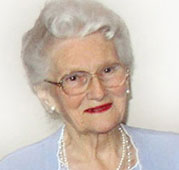 Eileen Caddy |
Group meditations were favoured in Experience Week. A twenty-minute session was often preceded by readings from texts such as Eileen Caddy’s Opening Doors Within (1987) or the more popular “channelled” work entitled A Course in Miracles (1975). The latter book, an American import, has caused many confusions. Eileen Caddy (d. 2006) was the British co-founder of the Findhorn Foundation. She is noted for a “God Spoke to me” projection.
However, introspection was not the dominant tendency. The new age body language was prevalent. “Eye contact was encouraged; tears, laughter and hugs often ensued as the week progressed.” Critics said that the art of cultivating knowing looks was insipid, not to mention disconcerting.
According to the partisan commentator Steven Sutcliffe, the aim of Experience Week was a feat called “self-realization.” That phrase is evocative of some very confusing developments in America associated with the Human Potential Movement. However, Sutcliffe was here borrowing heavily from a brief statement in Eileen Caddy's book The Living Word (1977). The quoted passage reads:
"And in the end you will reach your goal: your self-realization of Me - the divinity within you."
Such references are deemed poetic by critics, especially as Eileen Caddy was here presuming to be a medium of utterance for God (Me). At least she referred to an ultimate objective (the goal) rather than the "now" which is so very popular in the new age.
The basically casual approach to such lofty matters at the Findhorn Foundation, and the frequent assumption of achievement and expertise via "attunement," are not regarded elsewhere as being convincing. This despite the partisan commentary on the internet which reported:
It is claimed that when negative psychological states and destructive behaviours are recognised for what they are, they may subsequently be transformed through the agency of a holistic self waxing in wisdom.
This very optimistic gauge of events is not confirmed by dissident accounts ignored by partisans.
For the partisan commentary, see Steven Sutcliffe, The Authority of the Self in New Age religiosity (1995). Compare the critical data at Findhorn Foundation Commercial Mysticism (2008). See also Findhorn Foundation (2010).
A notable factor involved in "attunement" enthusiasms was: “The Experience Week groundrules implicitly discourage any form of critical enquiry.” Criticism is here associated with the destructive ego complex, as if the same complex could never manifest in the exemplars of “attunement” and “Experience.”
The confusions engendered by this form of thinking were legion. Nobody was permitted to criticise the Findhorn Foundation heroes, i.e., the staff members and “workshop” entrepreneurs. Maxims such as “we create our own reality” were ubiquitous, and ultimately quite meaningless. Most of the enthusiasts who voiced such slogans were completely unaware of the original context. For instance, “we create our own reality” was a belief of existentialism, a form of philosophy preceding the Human Potential Movement, and strongly associated with nihilism in some formats.
Dissidents like Kate Thomas found that the confused thinking produced by "attunement" was a mask for numerous transgressions and inanities. One of the mandates in favour was: “Our purpose is to find the divine within, the criterion for which is the practice and experience of unconditional love.” That quote comes from an influential book published and promoted by the Findhorn Foundation (Carol Riddell, The Findhorn Community, 1991, p. 88).
Unconditional love is a theme strongly associated with Eileen Caddy, whose well-advertised audio tapes have included Loving Unconditionally. Given the strong profile of such themes and sentiments, the discrepancies are relatively easy to detect.
8. Superficial Myth of Unconditional Love
Though I lived in Forres for some years, I declined to participate in anything to do with the Findhorn Foundation. There was too much against them in my view. The insidious sentiments emerging in their literature were totally unconvincing. Conflict resolution, unconditional love, and spiritual education were just a few of the conveniences improvised by the economic agenda.
One day a distressed woman came to the front door of our home (Clunybank) and begged to see my mother. I was always wary of unknown persons appearing at the door in such close proximity to the Findhorn Foundation. I did not know about the situation of this woman. She asked to see my mother (Kate Thomas, alias Jean Shepherd). Her wish was granted. It transpired that the two had indeed met before. I was surprised at the details. This woman was the former partner of a problematic American staff member in the Foundation. She had suffered a great deal as a result of his indifference, and was now a shadow of her former self, as if her energy had been sapped.
The American male referred to had the repute within the Foundation of being a bisexual. He was liable to be aggressive, and was one of those hostile to my mother. I became annoyed at reports of his menacing behaviour, and offered to get police attention directed at him. My mother did not wish this, fearing more problems. The general situation was shocking, facilitated by the situation of charity status.
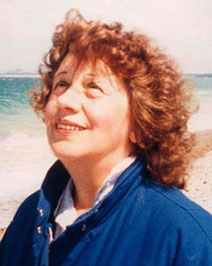 Kate Thomas, Findhorn 1988 |
Kate Thomas found that the only member of the Foundation staff who had any conscience was Ken Hills, a former Christian vicar. This man became sympathetic, both to her and to a woman who had been victimised in the past by Franciscus. The suffering woman (GW) returned to the Foundation after several years, having been told that things had changed, as Hills insisted. He encouraged GW to continue with joining anew, but was disconcerted when the relevant official proved hostile. That official was Richard Mark-Coates, one of the prestigious staff, who opposed reinclusion of the former victim on the grounds that she was sympathetic to dissidents like Thomas and Stephen Castro.
The major reservation of Mark-Coates became evident. Castro had briefly criticised him in print for professing sentiments of love and acting hypocritically. The Foundation staff could not take any criticism, even in a mild form. They were always right, and therefore beyond criticism. This psychological tendency is well known, in more analytical circles, as one of the characteristics denoting an enclosed or cult mentality.
Mark-Coates proved that Castro had been correct. He subjected the former female victim to a new phase of victimisation. An abortive event officially called (by the Foundation) a “complaints and reconciliation” meeting occurred in January 1999. This event is on record in both published and internet format. That very sad episode confirmed several points which are not flattering to the Foundation profile.
On the crucial occasion at Cluny Hill College, Ken Hills faltered in his sense of conscience, reverting to standard Foundation fear of authority. He now declined to say a word in defence of the victim, who was lacerated by Mark-Coates and stigmatised as having “negative energies” because she was in sympathy with dissidents. GW was denied the possibility of rejoining, instead being treated as a psychological leper. She broke down in tears, and subsequently departed permanently to a distant part of the country. She was one of the few Scots to have entered the Foundation. GW was so psychologically affected by the unrelenting Foundation attacks that she no longer wanted her identity to be disclosed in reports, though her name is on published record.
The official Foundation version of this episode was that the dissidents (including GW) were in error. In fact, the dissidents had done their best to cooperate with impossible personnel whose conduct offends rational criteria. See Shepherd, Pointed Observations (2005), pp. 183ff.; see also Reconciliation Mockery (2008). Both Thomas and Castro attended the ill-fated meeting of January 1999, in a spirit of reconciliation that was eschewed and misrepresented.
So here we have an inverse example of “unconditional love” and “conflict resolution,” two of the commercial slogans favoured in Foundation precincts over many years. Perhaps only such a contradictory organisation could devise the acutely anomalous “reconciliation,” amounting to the scourge of a twice victimised female dissident by a very aggressive male officiant, in a manner designed to assert total superiority over any possible element of query or criticism.
9. An Obscured Legal Case
An English dissident, Jill Rathbone, had stood her ground against the vituperation and bullying tactics of Foundation staff. That telling episode occurred in 1994-5, when she was severely discriminated against by Foundation officials who blocked her rightful employment with the local Moray Steiner School. Her crime was that of being a friend of Kate Thomas. The Steiner school would not afterwards admit the involvement of the Foundation (for suspect reasons believed to derive from the injunction of the latter).
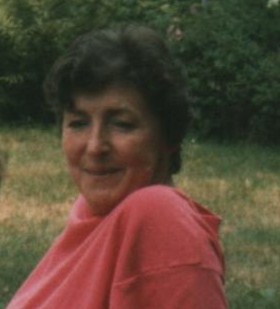 Jill Rathbone |
The law court at Elgin proved sympathetic to Rathbone, considering the opposition to be in a dubious category.
At the Options Hearing the Sheriff awarded her (Rathbone) full costs along with the compensation, which was understood to total at least £4-£5000. The Moray Steiner School afterwards contested the costs, but the award was upheld by the Sheriff, who further responded by charging a fee for his time. (Castro, Hypocrisy and Dissent within the Findhorn Foundation, 1996, p. 176)
Such factual events were taboo in Foundation annals, which instead preferred the make-believe lore of attunement, empowerment, holistic education, spiritual wisdom, healing, ecological expertise, and conflict resolution. The Castro book (an annotated and indexed factual document) was declared anathema by the Foundation staff, who regarded the content as unreadable and a dire heresy.
Findhorn Foundation promotionalism has a very low rating in critical circles. The partisan gloss influenced the endorsing UN bodies unable to penetrate surface appearances. The difference between truth and falsehood is graphic in the new age, where presumed “holistic” expertise jettisons factual documents in favour of commercial “workshops” encouraging a basic lack of discernment.
10. Being Neighbours with New Age Gestapo
The very severe Findhorn Foundation attitude towards Kate Thomas (my mother) became notorious amongst Scottish locals, not least because of her close proximity as a neighbour to the Foundation centre of "education" at Cluny Hill College. In 1991, she acquired one of the most celebrated properties in Forres, situated on St. Leonard's Road and known as Clunybank. This was a Scottish mansion built in the nineteenth century, clearly visible on the slopes of Cluny Hill in Forres. Clunybank was only a few hundred yards from Cluny Hill College, the "new age" centre from which my mother was banned in 1994 by the dictatorial Eric Franciscus (a German), who was acutely averse to any form of criticism or contradiction. That official gained the reputation of a gestapo officer amongst dissidents; he contrived distorting slanders against Thomas, which proved influential amongst the Foundation staff.
 Clunybank, Forres, 1991 |
Clunybank had twelve bedrooms. This building featured some elements of syncretic "neo-Gothic" architecture and a fine carved pine staircase. My own rooms were at the front of the house, as my mother felt concerned about possible visitors or intruders (from the Foundation) who might be difficult or belligerent. The large oak entrance doors were kept shut. I usually answered the doorbell.
The house being so large, I permitted the dissident (Foundation ex-member) Stephen Castro to lodge there. He was a sturdy man, and able to guard the front entrance whenever I was away. He assisted in various manual tasks that needed doing. The garden had been neglected for years, a new wall needed to be built, and one of the roofs was leaking. At Clunybank, Stephen also wrote his book Hypocrisy and Dissent within the Findhorn Foundation (1996).
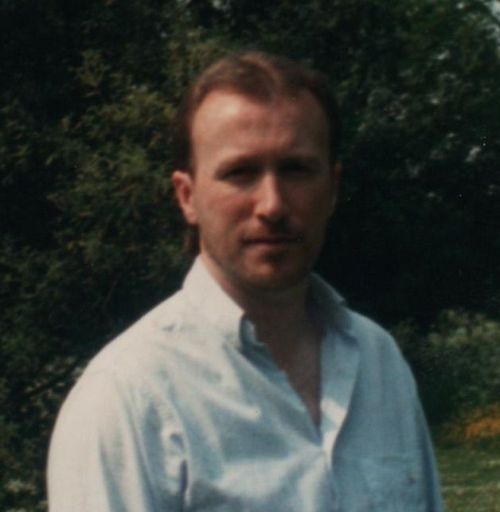 Stephen Castro |
I also insisted that Stephen Castro should accompany my mother on her excursions into Foundation precincts. I attempted to strongly dissuade her from going into the "gestapo territory." However, she wished to make visits to The Park (at Findhorn), so a male escort was advisable in view of the harassments known to occur. As early as 1991, the American staff member Loren Stewart had imposed restrictions upon her movements at The Park (a developing extension of the caravan park). American democracy in the new age is mythical. Even before the publication of her book (containing the critical chapter 14), the putative democrats were insular towards mild criticism of their dictatorial habits. A commentary reports:
In 1991, this American [Loren Stewart] prevented Thomas from entering the dining hall (in the Community Centre) that was adjacent to the Universal Hall. The disapproval of the segregationist carried the strident implication that the whole site (the Park) was out of bounds for her. Conscientious objectors were unfit for universality, which basically meant that Franciscus had moodily blocked the reapplication of Thomas for associate membership and strongly contributed to the distorted image of her. (Shepherd, Pointed Observations, 2005, p. 215)
 Universal Hall, Findhorn Foundation |
The contemporary building known as the Universal Hall accordingly has a reputation for parochiality amongst critics. Thomas would subsequently visit the cafe and the bookshop at The Park, after being eliminated from Open Community membership in 1994 by the Canadian insularity of Judy (Buhler-) McAllister. I became so dismayed by Foundation staff aggression at one stage that I wished to enlist police assistance. However, my mother declined this resort, fearing more problems as a consequence. She would say that she had moved to Scotland solely because of the Foundation, and that in the face of bullying dogmatism and unmerited stigma, she had the right to see something of what was occurring in the vaunted precincts suppressing relevant objections.
Some of the Foundation officials were envious that Kate Thomas had acquired Clunybank. This distinctive property was in fact closely associated with the Foundation. During previous years, the big house had been a hotel, catering to many Foundation visitors. Indeed, at one period Eileen Caddy had used a room on the top (third) floor for meditation. The Foundation had not been able to purchase Clunybank, lacking the funds to do so. The hotelier had sold up, vandalising the grounds by selling off a portion of the large garden to a builder. An interim owner had since been in residence; he was not a Foundation partisan.
I made a point of studying the background of diverse Foundation entities that my mother frequently mentioned. Some of the staff members viewed their role as a means to commercial celebrity, or as a stepping stone to further opportunities (in other countries) via the contacts they made. Certain of my mother's opponents disappeared from the scene after a few years. One of them kept going away and reappearing, eventually departing permanently. Another case of reappearance was Craig Gibsone, who after his phase of Directorship expired, was often absent in South America, his activities maintaining the Holotropic Breathwork that was officially suspended on the home front.
The "spiritual community" was a very deceptive ideal, especially when the disgraced management team resigned in circumstances carefully screened from general view. The economic situation of the Foundation was dire even by 1997, the year they gained NGO status by concealing problems.
Eileen Caddy had by far the strongest profile of the Foundation celebrities. Of the others, Gibsone became the most well known, perhaps largely because of his connection with the Holistic University of Brazil, a controversial institution whose rector Pierre Weil chose to harbour Holotropic Breathwork. Most of the staff who opposed Kate Thomas never gained fame outside Foundation precincts. They did not write books; their images were frequently not publicly available on the web. Eric Franciscus remains obscure, despite his claim of being viewed with divine favour.
Alex Walker is more prominent, having contributed an edited book (The Kingdom Within, 1994). He became known as a businessman in the sector of ecovillage interests, but (like Franciscus) did not feature in "workshops." Many of those who seek star roles in "workshops" have been unsuccessful in any other field. The floating population in evidence at the Foundation during the 1990s doubtless contributed to the strategy of "try your luck." The affluent international clientele in this "workshop" sector is exceptionally gullible.
Judy (Buhler-) McAllister had to vacate her staff role as Director during the economic crisis. She afterwards recuperated as a "workshop" expert on conflict resolution (or facilitation, to use the pervasive American idiom). For several years she was part of the Foundation Consultancy Service, in which capacity she was still being promoted in 2004, when a "Group Facilitation" workshop was advertised in terms of:
Moments of disturbance or conflicting opinions are rich with potential for finding ways forward and defining next steps; resolution - however temporary - allows movement to occur. (Findhorn Foundation Courses and Workshops May-October 2004, p. 31 col. one)
She was by that time known as Judy McAllister. See section 5 above, relating to a major event of exclusion in 1994, when McAllister rewarded the reconciliation effort of a conflicting opinion with ruthless elimination from Open Community membership. That total lack of resolution was permanent in the complete absence of movement.
Judy McAllister subsequently left the putative Consultancy Service, instead branching into other workshops such as "Nature, God and Us." In 2009, she appeared in "Coming Home," a workshop event promoted in terms of:
Finding the homeland of God, the life force in everything, within ourselves enables us to see and experience home all around us, everywhere. (Findhorn Foundation Workshops and Events May-December 2009, p. 27 col. one)
The workshop price was here advertised on a sliding scale of £535-£825 for a week.
The same commercial brochure extols McAllister in terms of: "Home is wherever she is" (ibid:37). The homeland sentiment did not of course apply to the home of a well known neighbouring dissident amenable to reconciliation, who was excluded from Open Community membership in 1994 by a legal contrivance that amazed Scottish locals in Forres.
New Age workshops are viewed by many critics as an indulgence, mounted for commercial reasons, employing sentiments and slogans which too frequently have no effective meaning. The annual "workshop" programme of the Findhorn Foundation has comprised a strong funding source over many years, a factor contributing to the suppression of all criticism of this programme. In my own view, honest crafts activity is far better than the "workshop" vogue of pseudo-spirituality imported from America. The old age creators of the Victorian neo-Gothic staircase at Clunybank might have reached heaven much quicker than the dissimulators of "conflict resolution" in the new age.
 |
The Foundation attitude of hostility, contrived stigma, and continual suppression contributed to a telling event. When a BBC television crew contributed a feature on the Findhorn Foundation in 1992, one or two officials responded to my mother's request for an extension appearance. This was a few months after publication of her book and the attempted Foundation interdict.
When the camera crew arrived at Clunybank after filming the Foundation, their supervisor had clearly been influenced by Foundation staff views against my mother. He was very flippant in his treatment of her. "It is just your view against theirs," he commented, with the strong implication that she must be wrong in whatever she had said or written. She refused to proceed with the filming. I was not present at the time. When I heard soon afterwards what had happened, I telephoned the BBC management in London. The initial official response to the misadventure was "Oh no!" This was followed by evasion of a formidable kind. No apology was forthcoming. See also Michael Joughin and Findhorn Foundation Discrepancies.
Sir Michael Joughin (d.1996) was a prominent local Scottish critic of the Foundation. He questioned Kate Thomas closely about her side of the argument, being very keen to invite her to his own home. Sir Michael was impressed by the information she had at her disposal. He knew very well that Kate Thomas lived in a prestige house which she owned, and that she was not a vagabond healer or an entrepreneurial "spiritual guidance" activist. He was aware that she had gained support from medical doctors and leading journalists.
Sir Michael also knew that her objections to Holotropic Breathwork were soundly based in a sense of scruple. Formidable medical opinion confirmed her misgivings in 1993. He also grasped the full implications of a graphic situation in which a close neighbour of the Foundation strongly pursued reconciliation, only to find a tyrannical and ruthlessly suppressive hierarchy whose exclusion feat amounted to a total contradiction of their extravagant promotionalism and cliche.
As for myself, I visited the The Park on one occasion without making myself known. I walked all over the site, which had developed from the Findhorn Bay caravan park inhabited by the Caddys in the 1960s. I was offput by the adjoining aerodrome, a territory not conducive to idyllic peace and quiet. More to the point, I was unimpressed by the "global village" of caravans, rudimentary structures, and several eco-houses. The "whisky barrel" dwellings became celebrated in the promotionalism. Wooden abodes did not convert me, as I prefer stone or brick for housing. However, the major cause of my reservations was the knowledge that the Foundation eco-houses were part of a very commercial project launched during the 1990s. Dissidents knew about this trend in some detail. The land developers made money, while the Foundation debt increased.
The solitary wind turbine at The Park was insufficient to create more enthusiasm in the present writer; however, I was prepared to credit an ecological incentive within the community at issue. The only solid building was the Universal Hall, relying heavily upon the contemporary fashion for glass. I am not a contemporary enthusiast, preferring traditional models. However, that reservation was minimal by comparison to the knowledge that the "universality" did not extend to dissidents. Furthermore, I did not believe the new age gossip about the Universal Hall being situated on a supposed ley line.
Critics pondered the claims of universality, which were closely related to the underlying assumption of a spiritual prerogative. Just what did those claims amount to? Observers noticed that over the years, the Universal Hall was used for musical concerts, also associated with the ubiqitous theme of "workshops." Further, the Universal Hall was a venue for the screening of cinematic films.
The movie dimensions were accentuated in a local press report of 2009, conveying that the Universal Hall was one of eight sites to be awarded funding from the Scottish Screen Digital Projection Fund "to install projection equipment and allow access to a wider range of films." The information is given that "the grant of £35,000, subject to conditions, will transform the venue from an occasional cinema to a fully fledged regional film venue." Furthermore, the information is supplied that the Universal Hall "has screened films for 20 years with a capacity of 200, but thanks to backing from the fund, that could be set to increase to two screenings per week, including not only mainstream but independent and foreign-language films" ("Findhorn set to cash in on cinema funding," The Northern Scot, January 16, 2009).
This further confirmation of a commercial outlet, using a larger screen and enhanced sound quality, did not prove spirituality or advanced education. The Forres Gazette reported that in April 2009, an American movie was the focus of excitement, a basic theme being the discovery of "a pair of illegal aliens" living in a New York apartment. Tickets costing £4 were available at the door of the Universal Hall, with a reduction to £3 for the under-16s ("New Screen for Findhorn," Forres Gazette, April 22, 2009, p. 16).
The claims of universality and spirituality are not vindicated in the least by such commercial developments. The extensive confusions, enveloping the Findhorn Foundation programme, may rather serve as a warning against misleading conceptualism of the organisation at issue.
11. Necessity for Police Escort
From 1997 onwards, the Findhorn Foundation relied heavily in their promotionalism upon association with the UN Department of Public Information, because of their new NGO status. There were also various references to UNESCO in a sub-register. The major UN (United Nations) link for the Foundation was Pierre Weil of Brazil, a "workshop" innovator in something called The Art of Living in Peace, a discrepancy that unjustly discriminated against Kate Thomas via the agency of Stan Stanfield (section 4 above). This workshop was associated with UNESCO by the Foundation publicity.
The role of Weil was advertised in these suppressive circles as “UNESCO’s Advisor on Education for Peace.” See Criticism of the New Age (2008). The UNESCO-associated episode of contradiction was one reason why Thomas wrote her Letter to UNESCO (2007) in later years. A subsequent UNESCO response has received comment.
The real situation was not living in peace, but living in friction. For the victim, this entailed the endurance of acute animosity. The Judy McAllister regime and the sequel of vengeful exclusion, so deviously portrayed (in 1999) as "reconciliation" (section 8 above), was totally discrepant with the UNESCO myth of peace, exploited at the Foundation for commercial ends. When Kate Thomas became ill as a consequence of Foundation hostility, she was advised by friends and a relative to go back south.
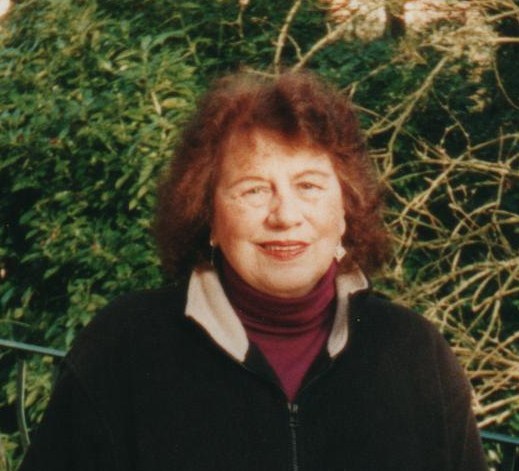 Kate Thomas, Dorset 2002 |
Kate Thomas moved to Dorset in 1999. She was later misled by a telephone conversation with a Foundation official. He appeared to be saying that she would be welcome if she made a visit to the community. However, others in England did not believe this. I told her bluntly that she would need a police escort if she went back to such a deceiving enclave of vindictive and dishonest entrepreneurs. She made a visit for one week in April 2001, an event on published record. There was no goodwill in evidence, and she again became ill (Shepherd, Pointed Observations, 2005, pp. 180-83). Now over seventy years old, she did not repeat the mistake.
12. Internet Defamation and Community Living
The reward of Kate Thomas, for this further gesture of reconciliation, has served to throw in relief what the Findhorn Foundation really are, as distinct from what they claim to be. In September 2002, their management opted to place on the internet a defamatory item against her written by a new age champion of “alternative community” who lived in Australia (though originating in America/Canada). This was Bill Metcalf, here associated in the Diggers and Dreamers item with Mable’s Treat, a location which many people outside Australia had never heard of.
A zealous Foundation supporter, Bill Metcalf composed a brief but very misleading item refusing to review the annotated book by Stephen Castro, a British dissident who was unpopular at the Foundation for describing events in a realistic manner alien to the commercial promotionalism. See my Pointed Observations, 2005, pp. 167ff (see also ICSA Fair Review and the Metcalf Evasion; also Bill Metcalf and the Internet Stigma). The dismissive Metcalf item was entitled Not a Book Review.
The distorting standpoint of Metcalf achieved an acute misinterpretation. He depicted Thomas and Castro as being engaged in "a co-ordinated 'cult-busting' exercise," an accusation far removed from the actual context of the events he refused to review. Metcalf asserted: "They (Thomas and Castro) have both maintained that they really want to join Findhorn, in order to save it." Neither of the dissidents mentioned ever made any such statement.
Metcalf also erroneously described Thomas as an “ex-housemate” of Stephen Castro in Forres. She (my mother) lived in the same house as me. I am tired of New World inroads against British family. Some alternative communities comprise a retrogression for civilisation, not an enhancement. The complacency and inaccuracy of the Findhorn Foundation does not inspire admiration in those who can duly review suppressed events and entities.
The calumniator Bill Metcalf is also associated with Griffith University in Australia. He is described on the internet, in that academic connection, as a social historian. The standards of discussion at Griffith University leave something to be desired. Refusal to review an annotated work is elsewhere deemed a barbaric gesture, one too obviously in favour of "intentional communities." Those communities require due criticism, just as other communities do, especially when the documentation is of the solid category attested in Hypocrisy and Dissent.
Dr. Metcalf fell uncritically for the stigma of Kate Thomas improvised by Eric Franciscus, who deemed himself to be the divinely appointed custodian of Cluny Hill College, an elevation blotting out all other considerations. Franciscus was the blanket champion of new age alternative therapy, believed in his circle to constitute "education," along with A Course in Miracles and the oracular works of Eileen Caddy. Grof lore was another aspect of the presumed holistic benefits. Franciscus was the official in charge of Education Department, a hindering innovation.
Partisan Bill Metcalf also wrote a short work entitled The Findhorn Book of Community Living (2004). This was a celebration of the purportedly ideal intentional community, one so perfect that no criticism is justified, and therefore punishable with adverse reflections and hostile judgments. Such writers live in a new age fantasy world.
Metcalf came from the neo-hippy era of the 1970s, when outsiders to the elite lore of liberation were regarded as fundamentalists and anachronistic conservatives. The new wave of myopic anarchists could do no wrong, in their own estimation. In reality, there were characteristics of semi-literacy, hedonism, superficial mysticism, and crude occultism (e.g., Aleister Crowley). In the American infiltration of the Foundation during the 1970s, David Spangler did usefully pronounce against drugs. However, the floating population comprised diverse attitudes to the confusing "new age."
A major drawback of “new community” was the acute tendency to become fodder for alternative therapy and "workshops," which the communards were unable to evaluate, having been divested of due educational standards by the so-called holistic movement. William Bloom and other "holistic" therapists became staple fare for the Findhorn Foundation.
The "social historian" Bill Metcalf ignored the relevant detailed reports of 1990s events. He instead castigated Thomas and Castro as having fought a "guerilla war against their neighbours." He says accusingly: "They were joined by a local right wing councillor, a conservative local doctor and a retired bureaucrat." These unnamed and despised conventional entities were the local Scottish councillor Robbie Laing, Dr. Sylvia Darke, and Sir Michael Joughin.
The victimisation of the Scottish woman GW was of deep concern to Laing and Dr. Darke. The context is entirely missing from the distorting Metcalf item entitled Not a Book Review. Such superficial commentaries, on uncomprehended and omitted events, underline the need to remain critical of "intentional communities" and their academic supporters. GW did not afterwards wish to publicly present her full name, fearing that the commune "mafia" might impinge with further rabid intolerance and threats (sections 5 and 8 above).
In relation to web gossip, the promulgation by Bill Metcalf of the Findhorn Foundation slander about "ex-housemate" places him in the same category as the now notorious cyberstalker of the Sathya Sai Baba sect, namely Gerald Joe Moreno of New Mexico. Metcalf has even less excuse than Moreno, who was borrowing from the former in his own misconstruction of events (see further Harassment Tactics extend Abuse on Google).
Bill Metcalf misleadingly presented Thomas and Castro as having "tried several times to gain membership" of the Findhorn Foundation. He says nothing of the fact that they were both associate members at one period, while Thomas was also an Open Community member deviously suppressed in 1994 under very suspicious circumstances (section 5 above). The Metcalf version is an accomplice to the earlier denial of Alex Walker, in 1992, that Kate Thomas had ever been a member (section 2 above). These acute shortcomings of the Findhorn Foundation public relations policy warrant an ongoing critical analysis of the registered charity facade and "intentional community" claims to prerogative.
13. Hazards of Nonjudgmentalism
In England, Kate Thomas participated in the Scientific and Medical Network (SMN), another organisation with which she became disillusioned. Though more intellectual in orientation than the Findhorn Foundation, the SMN displayed a strong angle of convergence with the same broad “alternative” background of therapy and pop-mysticism. In particular, Thomas discovered that the psychedelic Grof disciple, Christopher Bache, made substantial inroads via the presiding figure of David Lorimer. Bache was an American academic who taught a rather uncompromising form of LSD "therapy" as a spiritual path, a theme mirroring the deepest beliefs of Stanislav Grof.
 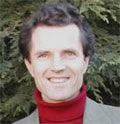 l to r: Christopher Bache, David Lorimer |
Kate Thomas opposed this psychedelic development in two articles written for the SMN journal in 2003. She found that support for her incentive was weak in a milieu fed with distractions by Lorimer and others. The scope for underground LSD consumption in Britain was accelerated via SMN patronage. For six years (until 2010), David Lorimer promoted on the SMN website a publicly visible Bache article pitched against Thomas. This questionable feat has aroused strong criticism in more perceptive circles than alternative "science and medicine." See Neglected Papers Against Grof Therapy.
Thomas resigned from the SMN on a point of principle in 2004. The following year, she discovered that a Findhorn Foundation Trustee, namely Janice Dolley, was a strong supporter of the underlying Lorimer viewpoint that psychedelic and related drugs must not be discriminated against in any way. Grof and Bache were victorious in this sector to a very significant degree. There was no effective insulation against the doctrine of LSD as a spiritual path, a doctrine potentially disastrous for large numbers of uncritical subscribers to the SMN, the Findhorn Foundation, and various other organisations in ideological proximity.
The alarming disclosures of Janice Dolley were made in the specific context of debarring Thomas from membership of the University for Spirit Forum (a creation of Lorimer that subsequently floundered). This was because Thomas opposed drug usage. The reservation about drug usage was considered a judgmental drawback, greatly inferior to the SMN attitude of nonjudgmentalism in such matters [see David Lorimer, Findhorn Foundation and Contesting New World Values]. Many victims of drug promoters live to regret their susceptibility.
The implications of this matter were grave. The Findhorn Foundation and the SMN are both closely associated with the trend of extreme nonjudgmentalism. This means that, within the contested trend, only sober critics are judged as being deficient, all the new age lunatics being pardoned and glorified. While the damage caused by drug usage was accelerating in Britain to an alarming degree, “alternative” organisations were sustaining problems from a superficial standpoint of “spirituality.”
David Lorimer was in league with the Institute of Noetic Sciences (IONS), the American "alternative" organisation reputed to have many psychedelic affiliates, including Bache. IONS here signified economic ballast, via subscriptions of IONS members to the SMN. Economic drive is a partner of hazardous nonjudgmentalism. See further Thomas, Scientific and Medical Network Events 2000-2004. See also my Letter to Robert Walter MP.
A letter of complaint on these matters was addressed to David Lorimer, circulated amongst over sixty members of his organisation in 2006. He chose not to reply. Only one member of the SMN possessed a sufficient sense of scruple to respond. The others may be classified as probable supporters of Lorimer nonjudgmentalism, who might even now be dosing their friends with hallucinogenic substances and MDMA.
Ecstasy is regarded as confectionery in “recreational” circles. MDMA (Ecstasy) therapy was a favoured activity of Grof, at Esalen in California, before coming under legal prohibition in the 1980s. A single dose of MDMA is fatal for some types of metabolism. The problems with MDMA and LSD are closely linked in Grof circles. MDMA can easily lead to LSD usage, also to other strong drugs such as cocaine and heroin.
14. The UNESCO Problem
Such hazardous complications were amongst the factors mentioned in the Letter to UNESCO (2007) composed by Kate Thomas. That epistle was concerned to document the problem of suppression and stigma encountered by the victim at the Findhorn Foundation. The letter was addressed to the Director General of UNESCO, who failed to reply. However, some other parties on the cc. list made a due response.
 Robert Walter MP |
This matter was subsequently taken up by the local MP of Thomas, who was very sympathetic to her case, noting the discrepancies in this unusual situation. Robert Walter MP sent a relevant communication to UNESCO, quickly eliciting a reply by email dated 02/09/2008. This abbreviated response has aroused comment. UNESCO here disowned affiliation with the Findhorn Foundation (see UNESCO Issue).
One interpretation is that UNESCO wished to offset embarrassment at their failure to respond a year earlier. The UNESCO personnel doubtless grasped that they had underestimated the issue, which was not going to be forgotten in political circles. UNESCO bureaucracy are known to have made errors in other directions, neglecting some issues. UNESCO evaded the Kate Thomas issue by rejecting any point of origin for Foundation sanction in their own direction. “Effectively, the Findhorn Foundation is not affiliated with UNESCO’s NGO and IGO system.”
The brevity of the abovequoted UNESCO email reply is open to criticism, evidencing a convenience preferring to ignore several related matters in which UNESCO are closely implicated, e.g., the peace workshop of Pierre Weil exhibiting the auspices of UNESCO (section 11 above). The DPI (Dept of Public Information) and UNITAR provided the primary sanctions for the Findhorn Foundation; however, the UNESCO website also participated. The situation demonstrates a form of bureaucratic evasion.
15. A Legal Complaint Commences
Meanwhile, Kate Thomas (Jean Shepherd) was in contact with different solicitors, both Scottish and English, probing the complexities under consideration for legal action. Opinions differed about the strength of her case, though the possibilities were generally acknowledged. The scope of the materials involved is quite substantial, i.e., extensive correspondence, related documents, published books, internet data, and yet other memoranda.
 Kate Thomas, 2002, aged 74 |
In 2007, Thomas had sent a letter to the new Director of the Findhorn Foundation, namely Bettina Jespersen. There was no reply. When Robert Walter MP contacted UNESCO as described above, he was careful to send a letter to Bettina Jespersen dated 28/08/2008. The Foundation Director again failed to reply. Even a person of MP status could be ignored by the evasive "spiritual community." This deficiency was not considered good form elsewhere. Robert Walter complained to Thomas and others that he had not received a reply. He eventually sent a further letter to Jespersen in October 2008. Again no response.
There was very little information available about the new Foundation Director. Foundation literature revealed Jespersen as a participant in the commercial workshop programme, her speciality being advertised in terms of “an accredited 5 Rhythms teacher.” 5 Rhythms was a trademark exercise described as follows: “This form of dance is a movement map designed to bring people into alignment: body, heart, mind, soul and spirit” (Findhorn Foundation Courses and Workshops May-October 2005, p. 13). The cost for a week of this exercise was £445 (inc. board and accommodation) in July 2005, the event co-focalised by Jespersen.
Thomas now resolved to act more decisively. Having been in communication with legal consultants, she instigated a preliminary recourse. Her solicitor sent a letter to the Foundation Director Bettina Jespersen dated 30/10/2008. This communication was headed For the urgent attention of Bettina Jespersen. That letter is here reproduced in full:
Dear Madam,
Our Client: Mrs Jean Shepherd also known as Kate Thomas
We have been instructed by our client in respect of the unfair treatment that she has received from your organisation. Our client maintains that she has been marginalised, stigmatized, and excluded by your organisation without foundation or indeed explanation.
Our client has made several attempts to resolve any issues in a conciliatory manner. Unfortunately her request for an official hearing has been ignored, and you have failed to respond to the correspondence from both our client and her MP Mr. Robert Walter.
This has left our client no option but to seek a resolution through any legal forms of redress available to her.
We therefore ask that you provide our client and her MP with an immediate response with a view to resolving this matter, to the satisfaction of our client, thereby preventing any public investigation or further legal intervention.
Yours faithfully,
Harold G. Walker & Company
Solicitor confrontation at last evoked a response from the evasive Findhorn Foundation hierarchy, who had formerly ignored the communications of both Thomas and Robert Walter MP. The Foundation Director first sent a brief email of acknowledgment to the solicitor and the MP, afterwards belatedly replying to the politician, who had sent letters dated 28/08/2008 and 20/10/2008.
The email from Bettina Jespersen to the solicitor and Robert Walter MP, dated 04/11/2008, read as follows:
I hereby acknowledge the receipt of Mr Walker’s letter dated 30 October, referring to your client Mrs Jean Shepherd, as well as the letter from Mr Robert Walter MP dated 20 0ctober.
Most of the staff involved in the process no longer work for the organisation, nor live locally. I will look into the matter and respond within ten days.
Best wishes,
Bettina Jespersen
Findhorn Foundation
16. Inaccurate Response from Bettina Jespersen
As events transpired, the stipulated response took slightly longer, a fortnight to be precise. Some discussion about the matter had evidently occurred amongst the Foundation elite. The reply from Jespersen, addressed to Robert Walter MP, was clearly intended as a vindication of the Findhorn Foundation policy. The letter of Jespersen, dated 18/11/2008, is here reproduced in full:
Dear Mr. Walter,
Thank you for your letters dated 28 August and October 20. I apologise for the delay in replying. I have looked into Mrs. Shepherd's case, reading through extensive correspondence spanning 16 years (1988-2004) between her and staff of the Findhorn Foundation. Several attempts were made on both sides to resolve the situation without success.
During this time Mrs. Shepherd has written to many public officials and bodies. Some have investigated the matter to their own satisfaction and others may have chosen not to respond after an initial assessment of the situation. A few have asked us for clarification and were satisfied with our response and have dropped the matter.
If you would like more information regarding the Findhorn Foundation I invite you to approach our MP for Moray and your fellow colleague, Mr. Angus Robertson, who can report on the integrity of this organisation. Alternatively, you are welcome to contact longstanding trustees of the Findhorn Foundation Edward Posey OBE, or Lady Diana Whitmore, for more information. I would be happy to forward their contact details.
We will be instructing our lawyers to respond directly to Mrs. Shepherd, as we do not wish to enter into any further personal dialogue with her. From our point of view this issue was closed many years ago. Having said that, we wish Mrs. Shepherd well in her advancing years and hope that she can finally put this matter to rest and find peace.
Kind regards,
Yours sincerely,
Bettina Jespersen
Chair of Management
The Jespersen response contains notable inaccuracies and contractions of extant data. Indeed, to such a degree that the above quoted letter cannot be taken seriously by well informed analysts. The attempt to vanquish the dissident from all reckoning is not commendable. This factor does not confirm the lofty prerogative assumed by the organisation at issue. Indeed, that organisation once again proved an incompetence and superficial intention. The Foundation version of events simply does not match the more inclusive data, continually screened out by the ongoing commercial "spiritual education."
Because of serious deficiencies in the official response from the Findhorn Foundation, I despatched an obligatory communication to Robert Walter MP dated 27/11/2008. That official had sent a covering letter to my mother (Kate Thomas, Jean Shepherd), dated 21/11/2008, along with a copy of the response from Bettina Jespersen. The covering letter from Robert Walter ended with the statement: “Thank you for taking the time to write to me raising this issue, and please do not hesitate to contact me if I can assist in the future.”
Bettina Jespersen (a Brazilian) demonstrated an unfamiliarity with source materials and ongoing documents. She evidently assumed that her letter dispelled any objection to the Foundation position. The truth was exactly the opposite. The Foundation had now been caught out on paper at management level. See my Letter to Robert Walter MP.
17. Further Delays and Correspondence
The assertion of Jespersen that “this issue was closed many years ago” is quite insufficient to satisfy the ethical and legal complexities attached. The Foundation management were clearly ignoring much more recent events, not to mention earlier ones. Jespersen also said: “We will be instructing our lawyers to respond directly,” meaning to Kate Thomas (domestic name Jean Shepherd). This did not occur.
In actual fact, a further communication arrived from the Foundation management, again belatedly. This time the correspondent was Communications Manager Eva Ward (an American), whose letter dated 09/01/2009 was addressed to the solicitor of Kate Thomas. The Foundation personnel had not previously contacted the confronting solicitor by letter, but only the MP involved. The letter to the solicitor is reproduced here:
Dear Sirs,
I refer to your letter to our Bettina Jespersen dated 30 October. I enclose for your information a copy of our correspondence to Mrs Jean Shepherd’s MP, Mr. Robert Walter, dated 18 November 2008.
We consider the matter to have been concluded. If, however, Mrs Shepherd wishes to continue with this issue, please in future contact our solicitors directly at the address given below, stating clearly the legal basis of the claim, if any, that Mrs Shepherd wishes to make.
Thank you for your attention.
Sincerely,
Eva Ward
Communications Manager
The solicitor of Kate Thomas was already in possession of the Jespersen letter to Robert Walter. That solicitor had since remarked upon the prolonged delay created by the slow Foundation responses. The Foundation management were demonstrating evasion.
 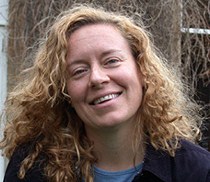 Kate Thomas, 1995; Bettina Jespersen |
Kate Thomas (Jean Shepherd) now composed a letter for the purpose of confirming her intention. This communication addressed to her solicitor, dated 22/01/2009, is reproduced here in full:
Dear Sirs,
RE FINDHORN FOUNDATION
I refer to the recent letter from Eva Ward, Communications Manager of the Findhorn Foundation, dated January 9, 2009. The rather contemptuous dismissal of my case invites future contact with their Edinburgh solicitors. “We consider the matter to have been concluded,” says Eva Ward, in continuation of the extremely misleading response from Bettina Jespersen, the Chair of Management.
It is here my request that you forward to their solicitors a copy of my son’s lengthy letter to Robert Walter MP, dated 27/11/2008. I also request that you forward a copy of the present letter as a statement of my response and intention. Taken together, these two letters represent many of the reasons why the Findhorn Foundation dismissal of my objections cannot be allowed to pass uncontested.
I object strongly to the dismissive and distorting attitude of the two officials Bettina Jespersen and Eva Ward. They have both demonstrated the flaws in communication about which I have been complaining for many years. Even at those junctures where I did receive a response from the reluctant Foundation staff, the response was generally unsatisfactory and tending to a strong degree of evasion.
I still wish to know why I was stigmatised and marginalised in the first instance, and I underline the fact that there has never been any adequate explanation for the ongoing stigma and bad treatment, now documented in various books, letters, and website articles. These materials are continually evaded by the Findhorn Foundation personnel.
I now wish to proceed with a legal action to remedy this appalling state of affairs.
Relevant here is to indicate the background of the two personnel who have most recently demonstrated evasion. Neither Bettina Jespersen or Eva Ward has any academic qualification or any other known administrative status outside the Findhorn Foundation. Instead, they both have a history of participation in the commercial workshop programme of the Foundation, which is notorious for charging high prices. Some of the objections to that programme are expressed in Findhorn Foundation Commercial Mysticism. Neither Jespersen or Ward are mentioned in that article.
In 2005, Bettina Jespersen (a Brazilian) was listed in the Foundation programme as an accredited teacher in 5 Rhythms, which is a trademark alternative therapy or form of dance. That year she was co-focalising three related “workshops” for £445, £435, and £425 respectively. She also co-conducted two similar workshops the previous year for £395. Foundation charges continue to escalate.
Eva Ward (an American) has been described in the promotional literature as living at Findhorn for many years, and as being a practitioner of Tibetan Buddhism. She was co-focaliser in “workshops” during 2004-05, at £695 for two weeks and £395 for a week. These activities are not sufficient justification to dismiss a complaint requiring due attention. Further, I find very questionable the promotion for the Eva Ward “Awakening Heart Retreat” (July 2005), which stated the benefits in terms of “to become wiser and more compassionate with ourselves and our surroundings” (Courses and Workshops May-October 2005, page 13). The Findhorn Foundation idea of compassion realistically applies solely to their own in-group.
In view of the nature of their commercial record, I do not feel any the more obliged to accept the dismissal of my complaint by the two officials abovementioned. I now wish to add a specific observation that their enterprise is blindfolded by economic considerations which rule out matters of scruple.
I would be grateful if you could now proceed with my case against the Findhorn Foundation.
Yours sincerely,
Jean Shepherd [Kate Thomas]
18. More Evasion and Due Measures
The solicitor complied with the request, sending the two stipulated epistles to the Foundation solicitor in Edinburgh. A covering letter was included by way of explanation at this juncture. There was no reply. The English solicitor took a disapproving view of this laxity in communication.
Observers concluded that the Foundation had demonstrated an inability to respond to the data with which they were confronted. They had been given a fair chance to review the situation concerning the objector, but were non-compliant. Their failing at an ethical level was glaringly evident. In England, the verdict was expressed that any organisation with scruple would have adopted a more conciliatory tactic under such circumstances.
The English solicitor did not regard the letter from Eva Ward as being sufficiently authoritative or comprehensive. In the continuing absence of a reply to the documents despatched in late January 2009, the confronting solicitor sent a reminder to Bettina Jespersen dated 17/03/2009. This is reproduced here:
For the urgent attention of Bettina Jespersen
Dear Madam,
We write further to our letter dated 30th October 2008 to which we have not received a response.
On the 18th November you responded to a letter from Mr. (Robert) Walter and suggested that you would be instructing your solicitors to respond directly to Mrs. Shepherd. Our client is extremely concerned that no correspondence has been received from your solicitors.
Our client wishes to reiterate the position as set out in our letter dated the 30th October and advises you that she intends to pursue this matter using any forms of legal redress available to her unless this issue is resolved to her satisfaction.
We must ask that you or your solicitors respond to this letter within 7 days.
Yours faithfully,
Harold G. Walker & Company
This time a reply was quickly received, though of a negative complexion. Dated 24/03/2009, that response is reproduced here:
Dear Sirs,
I have received your letter dated 17th March, and am surprised that you make no reference to our response to you dated 9th January. Was this letter received? It was signed by Eva Ward, our Communications Manager, as I was on leave of absence.
We reiterate that we consider this matter to be concluded. Should Mrs Shepherd wish to pursue it further, please contact our solicitors at the address given in our letter dated 9th January.
Sincerely,
Bettina Jespersen
Chair of Management
The evasive nature of this response was obvious. The confronting solicitor advised Kate Thomas (Jean Shepherd) to take up close liaison with specialist legal experts able to negotiate organisations presenting difficulties. The client complied. Another solicitor now inspected the attendant documentation. The consequence was two further confronting letters. The first, dated 17/04/2009, is reproduced here:
For the Attention of Bettina Jespersen
Dear Sirs,
We are instructed by Mrs Shepherd and we have been provided with copies of correspondence passing between yourselves and Harold G. Walker, who were previously instructed by our client.
We note in your letter of 24 March 2009 that you consider this matter to be closed, and that if our client wished to pursue this through the courts, then she should contact your solicitors.
We have not written to your solicitors, as our client is interested in seeking some answers so that she may then close this issue. We would hope that you would entertain our client’s request and provide the information that we ask for so that once and for all, all parties can have closure to this matter, and can move on.
We are aware that you have already looked into the background of this matter, and you are aware that our client has been marginalised and excluded by your organisation. The difficulty our client has is in understanding why these actions were taken.
We are aware that our client was a member of your organisation until she was expelled, without any explanation.
We would be grateful if you could explain why our client was expelled. Whilst she accepts there is no specific right of appeal against that decision, she would like these questions answered. She does feel aggrieved, particularly as there has been no attempt to justify the actions taken. It may be that once you have looked into matters, you may find there is no justifiable explanation. If that is the case, in view of the well authenticated 15 years of hostility and exclusion, including the exclusion of anyone who vouched for our client’s integrity (and one of whom took successful personal legal action), she feels that some satisfactory financial compensation should now be proffered. Failing this, it is her firm intention, following professional consultation, to commence legal action.
We look forward to hearing from you by return.
Yours faithfully,
Jacobs & Reeves
19. Legal Statement of Problems
Other advisors deemed this preliminary communication from Jacobs & Reeves to be mild in view of the circumstances. Kate Thomas (Jean Shepherd) then gave instructions for a more forthright approach, promptly expressed in a letter fom the solicitor's office dated 23/04/2009. The sequel is reproduced below:
For the Attention of Bettina Jespersen
Dear Sirs,
Re: Our Client Mrs Jean Shepherd
This letter is by way of an amendment and extension to our earlier communication of 17th April, and in accordance with the instructions of our client.
Our client is not willing to close this issue, despite your preference in that direction. Closure of this matter is not appropriate without the request of our client being honoured. Our client has requested answers that have not been forthcoming from your organisation.
We are advised that our client was a member of your organisation in different capacities until she was expelled from Open Community membership in 1994, without any due explanation. A published book mentions this subject in some detail. You should be aware that our client has been marginalised and excluded by your organisation without sufficient explanation, and with stigmas attaching that have percolated elsewhere to the unjustified detriment of our client and in overseas sectors other than your organisation, notably in relation to a controversial sectarian cyberstalker in America.
We are advised that this case of complaint of our client is unusual for the extensively documented 15 years and more (indeed, almost 20 years overall) of hostility on the part of your organisation. These developments included the exclusion of anyone who vouched for the integrity of our Client, and to the extent that one of those persons (Jill Rathbone) conducted successful legal action in 1995 against the Moray Steiner School, in a situation closely associated with the active and excluding influence of your organisation.
Our client had not formerly mentioned financial compensation, but instead took a more conciliatory approach, evidenced by the correspondence from our client’s previous solicitors with your organisation that has accumulated during the last several months. However, in view of the fact that you have considered this whole matter to be concluded and the grievance of our Client annulled, there are varied aspects of the situation which do not contribute to closure of this matter.
For instance, the grievance of our client includes the disruption of moving from England to the far north of Scotland in 1989 solely because of contact with your organisation, and the glowing prospects promoted by your organisation. We are advised that whilst living temporarily in Findhorn village, she discovered with dismay that the imported commercial therapy of Holotropic Breathwork was being launched within your organisation. She complained, but was ostracised for doing so by prestigious members of your organisation. That alternative therapy subsequently received a negative verdict from the Pathology Department of Edinburgh University in 1993, and this commissioned medical report influenced the decision of the Scottish Charities Office to recommend that your organisation suspend the potentially dangerous alternative therapy.
We are advised that our client never received any acknowledgment from your organisation that she had been justified in her complaints against Holotropic Breathwork, and instead she was suspiciously denied any basic membership in 1994, without due explanation. In the face of subsequent unsatisfactory developments concerning your organisation that are detailed in books and on websites (please note the plural), she left Scotland in 1999 after becoming ill due to related stresses closely attributed to the behaviour of your organisation. Mrs Shepherd advises us that she was at that time advised to return to England by a concerned relative. Medical doctors in Forres had despaired on various accounts over your organisation, which has the repute of not practising what it preaches.
Our client did move back to the south of England, despite all the inconveniences that this removal entailed for her affairs. She had been present at the disputed event known to your organisation as the “complaints and reconcilation” meeting of January 1999, which is on public record strongly contradicting the version of your organisation. In brief, our client moved to Scotland because of your organisation, and thereafter moved back to England also because of your organisation.
Her subsequent attempted reconciliation in 2001, at the age of over seventy, and in person through means of a direct visit to the Scottish premises of your organisation, is documented in published format and on website media. That documented episode is not effectively contributory to any premature closure of the overall complaint of our client.
In conclusion here, our Client advises us that she has direct witnesses of varied aspects of her residence in Forres during the 1990s, and in such close proximity to your organisation. Those witnesses include her son, who has explicit records of what happened in relation to certain of your personnel. Such witnesses and documentation are a further reason why closure of this matter is not a realistic prospect for our client, despite the preferences of your organisation to the contrary.
Yours faithfully,
Jacobs & Reeves
The sole response to this solicitor communication was a brief email dated 08/05/2009, which read as follows:
Dear Sirs,
Thank you for your letters, dated 17th and 23rd April. We are looking into the contents and taking advice and will respond in due course. Kindly acknowledge receipt.
Yours faithfully,
John Lowe (General Secretary, Findhorn Foundation)
John Lowe is on record as having been part of the Foundation management team in the late 1990s, at the fraught period when economic problems were concealed to facilitate acquisition of NGO status in 1997.
20. Denial of Membership in Foundation Ruse with Solicitor
There was no further response for over four months. The ensuing communication has been regarded as proof, if any further demonstration were needed, that the Findhorn Foundation exemplify evasion and lack of scruple. The communication from the Foundation to the solicitor, dated 24/09/2009, read as follows:
Dear Sirs,
Re: Your client Jean Shepherd. With reference to your letter of the 23rd April last, The Findhorn Foundation has no record of Jean Shepherd ever being a member of our organisation. We are aware, however, that she was in communication with an independent organisation at the time, called the Open Community, also based at Findhorn.
Our understanding is that the Open Community refused her membership. It is important to clearly convey to you that the Open Community was never a part of the Findhorn Foundation. It was an independent organisation that disbanded many years ago.
Please direct any further communication directly to our solicitors, Messrs Tods Murray.
Yours faithfully,
Ana Rhodes-Castro (Chair of Management) John Lowe (General Secretary)
This flawed communication is contradicted by any due investigation of the records, both published and online. The attempt of the Foundation hierarchy, to persuade a solicitor to the contrary, was unsuccessful. The blatant lie was attended by a general mood of complacency within the Findhorn Foundation after their acquisition of CIFAL status in 2006. John C. Lowe was simultaneously the secretary of CIFAL Findhorn Ltd. The secretarial ploy is not difficult to detect. "CIFAL here denoted dishonesty and dissimulation" (Vatican of the New Age).
Under the circumstances, it was appropriate for myself, on behalf of my mother, to reply to the Foundation breach of reporting, in a letter despatched to their solicitor Tods Murray. That letter comprised 12 points, nine of which are sufficient here, the other three remaining on file for eventualities. My letter, dated 15/10/2009, read as follows:
Dear Sirs,
Re: Your client Findhorn Foundation. This letter is in response to the lamentable gesture of your client, the Findhorn Foundation (abbreviation FF), who have recently sent a gravely inaccurate letter (copy enclosed), dated 24/09/2009, to the solicitor of my mother Jean Shepherd (Kate Thomas). The following points should be stressed:
1) The FF continually disown any responsibility in urgent matters, and say "please direct any further communication directly to our solicitors." Herewith to oblige. The audience for these matters is getting bigger every month, not least because of the internet, a factor which even the FF evasion cannot offset.
2) My mother, Jean Shepherd (Kate Thomas) is eighty-one years old. The fact that the FF have maintained their evasion and dismissal for nearly twenty years, in such a ruthless and deceptive manner, has now prompted wide agreement that the FF are a deficient organisation meriting strong critical scrutiny.
3) The enclosed FF letter states that they have no record of Jean Shepherd "ever being a member of our organisation." This improvisation is effectively cancelled out by the documentation in three published books and also lengthy internet reports, all of which the FF continue to ignore. Their further distortion of the "Open Community" episode belongs in the same category of deviant strategy.
4) The FF management are clearly attempting to influence my mother's solicitor against her, supplying false and misleading information. This situation is not going to pass uncontested. The case against the FF is now that much stronger.
5) Stephen J. Castro's book was published in 1996, and is widely recognised by academic analysts as a relevant document. Castro, a personal acquaintance of my mother, was also victimised and marginalised by FF staff. His testimony alone is sufficient to negate the obtuse FF tactic. He was likewise an (official) associate member of the FF prior to his disillusionment. I am in contact with him; he is a strong witness to factual events. Castro also documented other victims of FF misbehaviour. Further, he dealt in detail, at an early date, with the episode of Open Community membership that the FF choose to acutely distort in their letter abovementioned. Their six lines of prevarication are totally insufficient to negate the more extensive reports (note the plural) of that episode dating to 1993-94, which in itself was merely one of the successive episodes so strongly telling against FF management procedures. A source in my possession is a 1994 tape recording of a conversation between my mother and the FF official Eric Franciscus. This tape is very revealing about FF strategy at that period.
6) It is now well known that my mother was prevented by dictatorial FF staff members from resuming her associate membership commenced in 1989, a matter which she herself documented in a published work. The promoters of alternative therapy relegated her to Open Community membership in 1993, having ignored her valid complaints against the medically unsound Holotropic Breathwork which they so commercially sponsored. The Open Community programme was an advertised extension of FF activities, and in 1993 was described in an FF information sheet as “designed primarily for people who have their own work projects but who are aligned to the spiritual impulse of this Centre [FF] and wish to establish an informal link” (Castro, Hypocrisy and Dissent within the Findhorn Foundation, 1996, pp. 113, 210 note 200). My mother was an Open Community member for six months before being further stigmatised by the FF Director Judy Buhler-McAllister, who caused her to be dropped from membership (while specifically using this word) after her due mention of a severe victimisation by FF male staff of a female Scottish subscriber, an episode which had passed without due rectification. That victimised subscriber (again abused by the FF in 1999) is another witness discounted by the reprehensible tactic of the FF management.
8) Another witness happens to be myself. I lived with my mother in Forres during the 1990s, and closely observed the stress caused to her by the FF staff, who repeatedly demonstrated a tactic that does not befit a charity-registered organisation and an NGO. The full documentation is stunning. I have access to both published and unpublished materials bearing upon this matter (including my mother’s last visit to the FF in 2001).
11) The fact that you are receiving misleading information from your client, namely the FF, is significant in the train of events. Of further relevance is the fact that Tods Murray are mentioned in the 1996 publication by Stephen Castro, now an employee of the Inland Revenue. Tods Murray are explicitly mentioned in relation to the Open Community membership issue of 1994, and in circumstances documented to an extent that is distinctly unfavourable to the FF cause that your firm then so controversially assisted (Cf. Castro, Hypocrisy and Dissent within the Findhorn Foundation, pp. 132-3, 135). The FF were so desperate to suppress valid criticism, and to ignore due rectifications, that they opted to deny the legal existence of FF membership. This extremist measure of 1994 is considered devious by a literate audience, affording proof of a flawed management policy.
12) The stigmatisation of my mother by the FF arose because of her resistance to the extremist alternative therapy of Holotropic Breathwork (originating in California), commercially promoted by the FF from 1989, in liaison with Grof Transpersonal Training Inc. Her warnings were subsequently justified by the verdict of Edinburgh University Pathology Dept, whose findings so alarmed the Scottish Charities Office that the latter body recommended for the hazardous and clinically untested therapy to be suspended at the FF. This was in 1993, the year before Tods Murray opted to assist the eccentric and extremist ruse of the FF management to eliminate my mother from the “Open Community” programme. Thus, your participation can be interpreted as an unfortunate justification for the sufferings of many Breathwork victims over the five year period of FF commercial indulgence, sufferings that were interpreted by the FF management in the most irrational “spiritual” terms, contrary to responsible medical and bureaucratic measures. Those measures continued to be defied by Breathwork practitioners within the FF, a situation causing further problems in London, where in 1995 the leading alternative therapist of the FF (William Bloom) blatantly promoted hyperventilation in defiance of medical cautions.
Yours faithfully,
Kevin R. D. Shepherd
c/o Jacobs & Reeves (Solicitors)
There was no reply to this letter of mine. The Findhorn Foundation, and their solicitor, were evidently freezing all response in the hope that the confronting situation would abate. They had now demonstrated a pronounced degree of evasion, confirming the many complaints expressed over the years. The confronting solicitor regarded this situation as a bizarre instance of organisational tactic open to strong suspicion. The reprehensible Tods Murray remain associated with defiance of medical cautions against Holotropic Breathwork "workshops" severely afflicting victims.
21. The Commercial Workshop System
The discrepant behaviour of the Findhorn Foundation, in a matter involving solicitors, was the worst statement possible for the rather elevated role which they ascribed to themselves. They demonstrated an evident lack of charity in a closely documented instance lasting for twenty years.
Some analysts say that the organisation in question will never be able to live this issue down. The discrepancies will show up regardless of the ingenuity (or apathy) manifested in the evasive strategy for which the Findhorn Foundation have become well known.
That same year, a 2009 Workshops and Events brochure of the Findhorn Foundation described their role in terms of "spiritual community, education centre, ecovillage." The first two clauses are strongly disputed. The third has also evoked reservations elsewhere. The "ecovillage" advantageously sold plots of land that were cheaply acquired, while the cost of "eco-houses" escalated in a commercial atmosphere of "sustainability." Preening staff members contributed to the pollution caused by air flights, as did the extensive overseas clientele (some dissidents had never travelled by aeroplane). The typically commercial nature of the workshop brochure compromised a fluent declaration worded as "our community's exceptional blend of spirituality and practical conscious living" (Workshops and Events May-December 2009, p. 5).
The accustomed reliance upon Experience Week (section 7 above) now achieved variations between £395 and £595. "Seven Days That Can Change Your World" extended to the Gay and Lesbian Experience Week in "the opening to the new" (ibid:7). The permutations of this commercial exercise soon extended to Youth Experience Week and Gentle Experience Week. The full array of commercial workshops was basically angling for the income related charge of £825 in the top bracket. There were references in Foundation web features to Cluny Hill College, Findhorn College, and Findhorn Foundation College. These were all commercial operations.
Caroline Myss was still a workshop favourite with Beyond Reason, such themes beguiling affluent subscribers who never wish to do any homework. Three days of Myss were now in the price scale of £395-£595. Craig Gibsone supervised A Meditative Landart Experience, featuring the income related price of £535-£825 for a week.
In a similar price scale was the fixture known as The Transformation Game, here represented by several workshops (at least two of these featuring Mary Inglis, another major Foundation celebrity). This well known moneyspinner, since 1978, achieved a variant in Transformation Solo Game Training, priced at £275 for two days (ibid:26).
The games played by deceivers here included the Nonviolent Communication Training Intensive, which emphasised "peace-making and peace-building skills essential in the transition towards a global community that is sustainable and compassionate" (ibid:21). The income related price was listed at £675-£875 for a week. The ghost of Stan Stanfield lived on, meaning that dissidents are uncompassionately kicked into oblivion by the hostile commercial system prepared to deceive solicitors.
The superficially alluring concept of Miracles at Findhorn also extorted in the £535-£825 sliding price scale. The ad said invitingly: "What better place to experience miracles than in the context of the Findhorn Community" (ibid:25). Letters from solicitors should be included in the non-hagiological components of the overall issue. This sobering addition will have to be implemented by outsiders to the system of workshop distractions and deceitful management strategies.
In the same price scale was Judy McAllister with Sustaining the Gaze. The ad states: "This workshop is an opportunity to explore the full spectrum of our responses - physical, emotional, mental and spiritual" (ibid:27). The ad does not mention the primitive responses to a closely neighbouring dissident on the part of Judy [Buhler] McAllister throughout the 1990s. There is no realism in the fantasy world of new age workshops intent upon evoking adulation and subscription. The tangibly commercial gaze is disconcertingly blind.
The Foundation Director Bettina Jespersen featured in three of the advertised workshops, including Biodanza 2 - Deepening the Dance of Life, priced on the sliding scale of £495-£735 for a week. The ad employed the statement: "If you would like to deepen the 'vivencia' and discover yourself as an infinitely radiant and loving presence, open and vulnerable to life in the moment, this invitation is for you" (ibid:26 col. 2). The message of present-centredness is here implied, evidently excluding letters from solicitors, while also stifling pressing questions amounting to why the present commercial moment ignores relevant complaints.
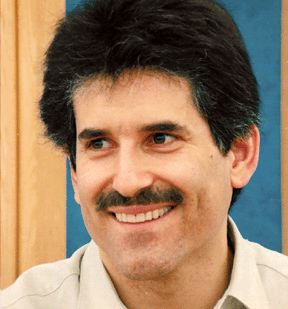 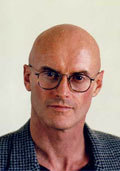 l to r: Andrew Cohen, Ken Wilber |
The inclusion of a well known American "neo-Advaita" guru was enthusiastically publicised as a major event in the 2009 calendar. Andrew Cohen acquired many supporters, and also lost most of them. The ex-devotees were very disapproving; some of the dissident complaints were acute. The Findhorn Foundation here presented Cohen under the rather provocative title of Co-creating an Awakened Culture. The workshop date was May 2009. The live Cohen was partnered by phone bridge with Ken Wilber, another disputed figure attaching to the "new age." The more traditional populations do not have to accept the implications of slumber on their part, especially in view of the price tag of £475 for a three day event of presumed awakening (ibid:14). See Ongoing Commercial Workshops.
More ambitious commercial overtones were signified by the 12-week programme Living from Purpose and Soul, displaying an income related price of £3250-£4250 (organisations had to pay £5250). This offering was described as "a powerful life training, engaging deeply with spirit" (ibid:13). The commercial spirit, exemplified by Findhorn Foundation price tags, should not be confused with more sublime factors.
The official Foundation message was: "It [the programme] can serve as a step on the path to becoming a member of staff" (ibid). Some observers deduced that the spiritual path was replaced at Findhorn by the path to staff status.
See also Findhorn Foundation Commercial Workshops.
22. Suppressed Letter to The Northern Scot
In February 2010, Jean Shepherd instigated a newspaper coverage in The Northern Scot of Elgin. This was placed on the front page. The presentation was strongly hedged by the response of the Findhorn Foundation, whose attention was directly solicited by the newspaper prior to the final editing process. The press situation in the far north was now very different to that obtaining in the 1990s, when freedom of speech against the Foundation was not considered a threat to local tourism prospects. Subsequently, economic gains were zealously pursued by Moray Council (who were keen to endorse CIFAL Findhorn Ltd, the personnel including local Councillors whose enthusiasm subsequently flagged).
In 2010, local newspapers were muzzled by the Foundation. The disabled Forres Gazette had become a Foundation supporter, blinded by the new CIFAL auspices (a failed project by 2018). The Northern Scot was more neutral at this juncture, nevertheless strongly compromised from the angle of unbiased journalism. The title of their article (dated 19/02/2010) was "Why am I being treated as though I'm poisonous?" The article accurately stated: "Even letters from her [Jean Shepherd's] solicitor failed to elicit a satisfactory answer."
Despite some vagaries of reporting, based on a telephone conversation in my mother's case, the basic position revealed in the front page feature was that of a dissident victim (Jean Shepherd) who had been banned and stigmatised by the Findhorn Foundation, also suffering many years of hostility. The Foundation response was eager to deny these details, and to intervene with a misleading interpretation.
The journalist failed to mention the book by Stephen Castro, which had been despatched to the newspaper office for due attention. The general context of the article was so unsatisfactory that I composed a letter addressing the discrepancies in evidence. This letter was sent to The Northern Scot, with a request to the editors that they publish this in the correspondence column. They ignored the request, without giving a reason. A telephone call to the newspaper office could only elicit the provisional explanation that the letter was probably too long. The office undertook to send a more detailed response by email, but failed to do so.
The newspaper feared the disapproval of the Foundation. The local press was now a puppet of new age commerce. My letter was fairly explicit, much more so than the abovementioned press article. Freedom of speech and critical assessment were no longer welcome to the Scottish press, unlike the situation over a decade earlier, before the disastrous UN affiliation had been secured by the commercial organisation under discussion. The suppressed letter, dated 10/03/2010, is reproduced here:
FINDHORN FOUNDATION AND JEAN SHEPHERD
I wish to lodge an objection to the very misleading statements of Findhorn Foundation “Communications focaliser” Eva Ward about my mother Jean Shepherd, as reported in The Northern Scot (19/02/2010). The contrasting details I refer to below are more fully documented in various books and websites.
I lived with my mother (Jean Shepherd, alias Kate Thomas) in Forres during the 1990s. I declined to join the Findhorn Foundation for reasons of ideology. Their treatment of dissidents, who included my mother, was appalling. They ignored my existence, contriving the fiction that my mother was the housemate of Stephen Castro, another dissident who produced a critique of that organisation (his book Hypocrisy and Dissent was published in Forres in 1996, and favourably reviewed by ICSA, the international academic organisation who investigate cults and other phenomena). Castro is now a senior employee with the Inland Revenue, and remains strongly critical of the Foundation.
There were many local Scots who were critical of the Foundation. Even some sceptical Scots were amazed at what happened to my mother; the sceptics included the late Sir Michael Joughin of Findhorn, who invited her to his home.
My mother became an associate member of the Foundation in 1989. That same year, this organisation chose to commercially promote the dangerous hyperventilation technique known as Holotropic Breathwork (HB), devised by Grof Transpersonal Training Inc. My mother was the first major objector to this folly, which was championed by the Foundation Director Craig Gibsone, an Australian who became an HB practitioner.
An HB victim and an alarmed local medic contacted the Scottish Charities Office (SCO), who commissioned a report from the Pathology Dept of Edinburgh University. A Regius Professor contributed a negative verdict. Accordingly, the SCO recommended in 1993 that HB should be suspended at the Foundation. That was after five years of casualties and the persecution of objectors. The Foundation management reluctantly complied with the suspension. However, a minority resistance (including chief HB practitioner Craig Gibsone) continued until recent years, defying medical cautions.
Local medics in Forres agreed with my mother about HB, an exercise known to induce hallucinations, trauma, vomiting, screaming, and violent moods. Yet the Foundation would never admit that my mother was correct in her opposition to HB. Instead one of their influential personnel banned her (quite literally) from Cluny Hill College (a therapy centre, formerly a hotel), despite the fact that she was a close neighbour. Eric Franciscus created the major stigmas that were vindictively applied to her for daring to criticise Foundation policies, significantly attested as hazardous by local medics, Edinburgh University, and the SCO.
Franciscus would not consent to see the victim, whose pleas for a democratic hearing were totally denied. In 1994, and under pressure, he arranged to meet Jean Shepherd once in a public cafe, treating her as an outcaste, in a dismissive manner that is preserved on a tape recording in my possession. That tape confirms his idiosyncratic attitude. Franciscus even said: “Whoever told you that life is just?” (Kevin Shepherd, Pointed Observations, 2005, p. 215). Justice was here a nebulous factor, to say the least.
On that occasion, my mother expressed a plea for a fair hearing against the stigmas created by the Foundation. The tape reveals that she had repeatedly asked for a fair hearing, which had been denied. She wanted to find out what the consensus view was. Franciscus said that he did not know, and excused the presiding figureheads. She said “I want my name cleared,” referring to the defamation created by Foundation personnel. Franciscus dismissed the request, employing evasive comments, e.g., he sometimes received “guidance” that he did not understand. This was a reference to ethereal guidance, which is impossible to prove.
An allied official was the new Director Judy Buhler-McAllister, a Canadian who refused to give the victim a fair hearing, instead annulling her existing Open Community membership in 1994. McAllister subsequently resorted to a controversial tactic which declared that there was no membership of the Foundation. Local Scots were amused by this ploy, membership being so frequently mentioned as an enticement in Foundation literature. The dubious strategy has been documented in the book by Castro. Franciscus had already blocked renewal of the associate membership of Jean Shepherd. Now the management obstructed the only other form of membership available.
This intrigue was substantially implicated as seeking to curtail further investigation of an embarrassing episode, in which a Scottish woman (G.W.) had been victimised by Franciscus and other personnel. This woman, who had defended my mother against defamation, was threatened by Franciscus, as is on record. This unfortunate victim eventually became ill with the mistreatment. She had to be rescued from her plight by a local medical doctor, whose verdict about the Foundation was searing. The same senior medic was later refused a due meeting with Director Buhler-McAllister, who sought to eliminate all criticism of the wrongs in evidence.
Castro reports (p. 128) that G.W. gained an unsatisfactory meeting with the Director, being told that there were no official minutes of an obscure Foundation enquiry into her plight, an enquiry which had been urged by concerned local Scottish Councillor Robbie Laing. The latter had himself been told that “the Foundation regarded this matter [of G.W.] as being closed” (Castro, p. 123). Closure became a favoured Foundation theme with regard to Jean Shepherd also, re-emerging in recent solicitor correspondence to discrepant effect, in the full spotlight of professional analysis.
Jean Shepherd sought reconciliation at every turn. This neighbourly gesture of hers was continually abused. She was relegated to the role of a toilet cleaner in her voluntary work as an Open Community member in 1993. In later years she merely walked through Foundation precincts; due to the hostility in evidence, she needed a bodyguard, namely Stephen Castro, another ex-member. At one period I wished to enlist police assistance against the aggression, but my mother did not wish this, and so I desisted. While all this was occurring, the Foundation elite described themselves as “a community demonstrating a way of life in conscious co-operation with God,” a phrase appearing on the cover of Castro’s dissident book entitled Hypocrisy and Dissent within the Findhorn Foundation (1996).
The abovementioned book was suppressed in the local area [by the Foundation staff], nevertheless gaining international attention outside “new age” ranks. Only two of the Foundation personnel ever attempted any form of reconciliation (in the late 90s), which quickly proved shallow in both instances. One of these was Trustee Ken Hills, who abandoned his scruple in a notorious episode dating to January 1999, when for the second time the Scottish woman G. W. was victimised for being a friend of Castro and Jean Shepherd (Pointed Observations, 2005, pp. 183ff.). G. W. had been told that the Foundation (now an NGO) had changed attitude, that things were now different. She found this facade to be a myth. She was shocked and tearful at the extreme hostility displayed, including the totally irrational argument about her “negative energies,” used as a pretext to reject her participation in Foundation programmes.
G. W. was effectively banned after demonstrating trust in the claimed abilities of the new NGO. She fled from Scotland, never to return to the vindictive Findhorn Foundation, preferring to live in Cornwall, in the far south, far away from NGO doubletalk (I am not permitted to divulge her name, in view of her aversion to Foundation hostility). She did not believe that the Foundation had anything to do with God or charity, despite the advertised charity status.
Meanwhile, schoolteacher Jill Rathbone from Cambridge had encountered another doubtful manifestation of “conscious co-operation with God.” The Sherriff of Elgin was a blessing by comparison, being sceptical about an episode concerning the Moray Steiner School, a close neighbour and satellite of the Foundation. In 1994, Rathbone was ostracised by the Foundation for being a friend and supporter of Jean Shepherd. As a consequence, she was denied her rightful employment with the Steiner School, being left stranded after moving hundreds of miles to the supposedly idyllic environment of “unconditional love” (a pervasive Foundation theme). In 1995, the Scottish Daily Express emerged with the headline Probe the ‘mafia’ cult, meaning the Findhorn Foundation. Jean Shepherd, Jill Rathbone, and others featured in the report.
“At the Options hearing the Sherriff awarded her [Rathbone] full costs along with the compensation.... The Moray Steiner School afterwards contested the costs, but the award was upheld by the Sherriff, who further responded by charging a fee for his time” (Castro, Hypocrisy and Dissent, 1996, p. 176).
Becoming ill as a consequence of Foundation hostility, Jean Shepherd moved back to England in 1999. In 2001 she was deceived, by a telephone conversation, into believing that she would be welcome if she made a return visit to the Foundation. Against other advice, she made the long journey, only to find the same hostility and indifference. She became ill and returned home. I have duly recorded my reaction at the time to the misleading telephone conversation with Foundation staff. “I was very sceptical on this point, and felt that she would ideally need a police escort to safely negotiate the hostilities nurtured in her direction by this hypocritical organisation” (Pointed Observations, 2005, p. 180). I still hold the same view.
The reconciliation effort of Jean Shepherd was rewarded the next year with a ruthless internet gesture of the Foundation management. Their suppression of the book by Castro had failed. Now in 2002, they openly endorsed a hostile and distorting item by one of their zealous supporters (Bill Metcalf), who declared that the Castro book was not worthy of a review. This manic tactic ignored the fact that Hypocrisy and Dissent had previously gained favourable reviews, including one from ICSA. The Metcalf dismissal, remaining on the web for years afterwards, cannot be taken seriously. The distortions include a defamatory component directed at Jean Shepherd, which has since gained legal attention.
The very recent Foundation tactic, addressed to The Northern Scot (Feb. 2010), seeks to escape all blame by tritely denying that Jean Shepherd had ever been banned, while erroneously claiming that they “genuinely tried to find peace with her over many years.” Eva Ward also misleadingly states that Jean Shepherd was “refused entry into an associate membership programme.” This is a deceptive reference to Open Community membership, which was not the same as associate membership. Jean Shepherd had formerly been an associate member, but was blocked in 1991 by the hostile Eric Franciscus, who in this aggressive process threatened a female Scottish objector (G. W.) with getting “burnt.”
My mother became an Open Community member in 1993. She was expelled (or banned) in 1994 by Buhler-McAllister. There was no due explanation, a deficiency aggravated by an improvised theme of “the Foundation has no membership,” which Scottish locals regarded as a contemptible ruse. “Observers were astounded at the lengths to which the Foundation elite were prepared to go to exclude any possible factor of confrontation with unresolved ethical issues which they strategically ignored as a charity status organisation” (Castro, Hypocrisy and Dissent, p. 135).
American focaliser Eva Ward now states that the “membership was for local people who supported the Foundation and who were working as volunteers; under the circumstances it was not appropriate for Jean Shepherd to be part of this grouping.” The reality is that her inclusion was very appropriate; she was the closest neighbour in Forres, living in a house long associated with Foundation activity; she worked as a volunteer cleaner in the Open Community, having paid a subscription fee for this membership, another fact on published record (Castro, p. 117). She had furthermore maintained a strong reconciliation policy, which was far more than the Foundation staff were able to achieve in their vaunted role as divine co-operators.
There is the accompanying argument from Eva Ward that “she [Jean Shepherd] has been welcome to visit and to participate in Foundation programmes.” This misleading statement employs the detail that Jean Shepherd was (past tense) on the mailing list for many years. Foundation brochures are available to anyone who purchases them, a fact which does not prove the contention at issue. The afflicted visit of Jean Shepherd in 2001 and the Foundation internet stigma of 2002 are acute contradictions to the focaliser form of persuasion [likewise the attitude of Foundation Trustee Janice Dolley who, in 2005, even agitated against the Thomas criticism of illegal drug use, a very suspicious pro-psychedelic gesture of reckless Trustee temperament]. Even more to the point here, Jean Shepherd does not wish to make another visit, and has instead clearly requested a suitable apology for her mistreatment and a cessation of stigma. Many observers believe that the apology would need to be substantial to convince a wider audience of any due integrity on the part of the Foundation.
Jill Rathbone discovered that there was a tangible ban on attending Foundation programmes in her own case. She endured miserable years of loneliness in Forres after losing her career prospects as a consequence of Foundation influence on the Steiner School abovementioned. She launched a crafts shop, and attempted to reconciliate with the Foundation. She was interrogated by a hostile American male, and found that she was punished by being refused admission to Foundation programmes. She received a curt letter from Foundation celebrity Alex Walker, dated December 1998, which refers to Rathbone “requesting that the Foundation lift the ban on your attending programmes.” Walker then proceeded to confirm the ban by inferring that Rathbone’s display in her shop window, of the dissident book by Castro, meant that she did not want association with the Foundation. This letter exemplifies the Foundation hostility to the dissident book, whose author was sympathetic to Rathbone’s travail. The Walker letter is reproduced online at citizeninitiative.com. See Hostility of Alex Walker in an article by my mother.
Rathbone later married a Scot who was deeply shocked at the treatment she had received over the years from Foundation personnel. She emigrated to Australia, escaping the harassment and accusations which had imposed an explicit ban.
Legal analysts have discerned that Jean Shepherd was stigmatised, suppressed, and marginalised by tyrannical authority figures averse to due investigations, and to criticism of their policy in the programme of commercial “workshops,” activities which too frequently amounted to lunatic fringe. Franciscus really did ban her from the Forres branch of the Foundation. The severe cordoning action of Buhler-McAllister in 1994 can be viewed in the same light, being designed as a total suppression, ensuring that the contemplated renewal of associate membership would not occur. This strategy also meant that the unfortunate Scottish sufferer G. W. would pass into oblivion. Jean Shepherd never gained the fair hearing she requested. G. W. had departed from the scene in total disillusionment, after losing both her wellbeing and her money.
Franciscus claimed that God had given him custodianship of Cluny Hill College, where he lived and worked. He did not express the ban of Jean Shepherd on paper, enforcing this cordon in various other effective ways. She could not enter the abode of the godly elite, who ensured that there could be no investigation of suspect occurrences.
Jean Shepherd was not banned at The Park (Findhorn). However, she was subject to restricted access at that site, and did not attend programmes in view of underlying hostilities. An officious American loudly berated her when she was alone on one occasion, insisting that she must not again divulge what had happened to her. Another American (an aggressive colleague of Franciscus) earlier prohibited her entry to the communal dining room, while strongly implying that she was an alien intruder to the entire Park, including the Universal Hall. This man had the reputation amongst dissidents of a bullying interrogator. Americans were generally the worst offenders, though Franciscus was a German. Americans were the new age brahmins, and Jean Shepherd was an untouchable, fit only to clean toilets. This was new age segregation with an edge.
There is the significant episode, dating to 1993, in which yet another vehement American focaliser (the “peace advocate” Stan Stanfield) physically obstructed her entry to a “workshop” (bearing the auspices of UNESCO) entitled The Art of Living in Peace. There was an emphatic vocal accompaniment. This despite the fact that the victim had paid for admission, and had already attended the morning session. The segregated woman was banned from the “peace” workshop, a deterrent to attendance at any further programmes. Foundation focalisers perfected the art of living in discord.
So intolerant were these people of other views, and factual reports, that they had tried to place a legal interdict upon her new book in 1992, because of a critical chapter about the Foundation. The management failed in this attempt, because their solicitor would not condone the extremism, doubtless being aware that in the normal world, a greater degree of democracy is permitted than in elitist groupings averse to criticism of anomalous behaviour and controversial therapy practices.
The misleading newspaper comments of American focaliser Eva Ward abovementioned, include the statement that “her (Jean Shepherd’s) name and reputation, from our side, is clear.” This cover-up makes no reference to the Foundation internet stigma commencing in 2002, in which the enduring influence of Franciscus is discernible. That stigma subsequently inspired a notorious American sectarian blogger, who has repeated one of the slurs involved; this matter has been referred to solicitors, who have expressed concern at the extra complication. In brief, the Foundation are now associated with the libellous Gerald Joe Moreno (alias Equalizer), a defender of the controversial Sathya Sai Baba sect. The Foundation would need to make an online repudiation of Franciscus, Metcalf, and Moreno for any credence to be given to their recent facesaver in The Northern Scot [they have done nothing of the kind, further emphasising their duplicit policy].
The acute errors in Foundation attitudes became evident to a wide variety of analysts of the ongoing solicitor correspondence, inaugurated by Jean Shepherd in 2008. This is available to view at www.kevinrdshepherd.info, along with the accompanying Letter to Robert Walter MP. Responses of the Foundation management to solicitors have been described as evasive in the extreme and factually bankrupt. They could not even tell the difference between myself and my mother, attributing my published letters to her. This was a massive error, especially in view of the many recipients of those various letters.
Another major Foundation blunder, dating to 2009, was the management denial to an English solicitor that Jean Shepherd had ever been a member of their organisation. This is easily disproven by available documentation. The denial was countered by the present writer in a lengthy unpublished letter to the Foundation solicitor in Scotland [section 20 above].
Furthermore, Robert Walter MP took up my mother’s case with UNESCO, eliciting a reply from that body after initial failure to respond. The Foundation did not reply to his relevant communications in 2008 until a solicitor commenced proceedings on behalf of Jean Shepherd.
Close analysts say that, in the absence of a full scale apology, the Findhorn Foundation will not be able to live down the numerous discrepancies in the accumulating files to date, whatever the tactics they use to support their doubtful angle on past and current events.
Yours truly,
Kevin R. D. Shepherd
There was no apology from the Findhorn Foundation, who retreated behind the awkward and deceptive facade improvised by Eva Ward, increasingly the major spokesman. The preferred devious tactic could not prevent anomalies from surfacing to local view. A number of suicides in the Foundation sector are one of the more obvious drawbacks, with some interpretations being very much to the detriment of alternative therapy.
Kate Thomas died in 2017, without the Findhorn Foundation having rectified their negative and deceptive behaviour, after nearly thirty years of evasion. That fact will realistically tell against the Foundation for many years to come.
There are currently numerous queries relating to malfunctioning charity organisations. The Findhorn Foundation claim to dispense spiritual education. Their very obvious commercial role, manifesting in an annual programme of contested events, is just one of the reasons why their claims and facilities should receive a more critical appraisal than their clients and the local Scottish media are able to achieve. Inflated by their tourism profile and former CIFAL status, the Foundation were able to muzzle the local press, and even attempted to deceive solicitors.
Kevin R. D. Shepherd
August 2009 - December 2020
Copyright © 2020 Kevin R. D. Shepherd. All Rights Reserved. Page uploaded August 2009, last modified December 2020.